ARCHIVE: This material is no longer maintained and should be viewed for reference only
For the latest on what's happening at the REAL Centre you can visit the REAL homepage where you will find links to our REAL Blogs and Events happening in 2020 and beyond
Professor Anna Vignoles awarded CBE in Queen’s birthday honours
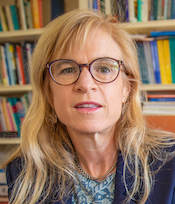
Anna is holder of the 1938 Chair in the Faculty of Education, University of Cambridge, and a Fellow of Jesus College. She is also a Fellow of the British Academy and a member of the council of the Economic and Social Research Council.
Her work focuses on ways both to improve social mobility and ensure people have the skills they need for the modern labour market. Her research using big data to illuminate the very unequal educational and economic outcomes for children growing up in different family circumstances has been highly influential, informing government policy and helping shape public debate.
Working with colleagues at the Faculty, Anna also leads nationally-significant research into how well the education system is meeting the needs of both individuals and the wider economy, including the vocational skills sought by employers in addition to academic qualifications.
Her work has produced important recommendations on ways to reduce the large socio-economic inequalities in educational achievement in the UK.
Head of the Faculty of Education Professor Susan Robertson said: “This is wonderful recognition of Professor Anna Vignoles’ contribution to our different
communities”.
Read our interview with Anna:
Many congratulations on your award! How does it feel to receive an CBE? I’m particularly delighted to receive this honour as it recognises the important work that we do at the Faculty of Education on understanding and trying to reduce the inequalities we see in individuals’ educational opportunities, and indeed their life chances in general.
We have a wonderful and highly multidisciplinary team committed to both researching these issues and then putting that research into practice to make a difference in children and young people’s lives. I’m particularly grateful to Dr Sonia Ilie who leads on the work we do on widening participation in Higher Education, which is a major priority for Cambridge, as well as the many colleagues who I work with in our two research centres that address inequalities in early childhood education (PEDAL) and in some of the poorest countries of the world (REAL).
Tell us about your career. Were you always an academic? No - the start of my academic career came when I was up in the North East. I had graduated in Economics from SOAS and was working in human resources, recruiting shop floor workers for a factory in South Shields.
We were using modern methods, psychometric tests, literacy and numeracy tests. It was actually a very hi-tech factory producing computer chips. And it really brought home to me the gulf between the kinds of skills that they wanted for their shop floor workers and the kinds of skills that many of the applicants - particularly men who'd been laid off from shipbuilding - actually had. I got really interested in labour markets and then was fortunate enough to be offered a PhD to study them at the University of Newcastle with Professor Peter Dolton, who was an amazing mentor. So I'm actually a labour economist.
What were your next academic steps? As my career progressed I went to work at the London School of Economics, and there I became more interested in education specifically as one particular aspect of the labour market. Eventually, in 2001, I decided that I wanted to completely specialise in education and I joined what is now UCL IoE.
You came to the Faculty in 2012 as Professor of Education – what drew you here? One of the attractions of coming here was the really interesting mix of different disciplines in the Faculty. And I like to think that, since I've arrived, we've also built up our expertise in the analysis of quantitative data. We'd always had a huge strength on the qualitative side and we had some fantastic professors here on the quantitative side but our group has grown from strength to strength.
Is it the data that fascinates you or a drive to tackle the inequality you identify? When you study things from an economic perspective, I think it's really clear that over a long period of time now, what has been really valued are cognitive skills - basically the kinds of skills that you get through academic achievement. And at the same time we were also expanding education. More people now go to university for example.
But I'm also driven by methods and data in the sense that I think there's still much more we can do in education research to be as rigorous as we possibly can be. And that's always excited me: the idea of using better quality data, thinking about really good theory and lots of good methods of analysis.
One of the issues that emerges from your research is how you have an outcomes gap between people who've had precisely the same educational opportunity but differing socio-economic backgrounds. Does that mean there's a limit to what education can do? Even if access to education was entirely equal and fair, education is not the only thing that determines people's success. We are definitely seeing that people from more advantaged social and economic backgrounds do better in the labour market. And the thing about economics is that we want to understand why. It's not enough to say, ‘of course it's a private school effect’ or ‘of course it's the effect of being well-connected’.
What we want is rigorous evidence on why is it that people from rich backgrounds get more from their education, get better outcomes even when they've got the same education level as someone from a poor background.
We really need to understand it because if it's a pure network effect then the solutions look quite different from if, say, it’s that students from rich backgrounds also have a set of other skills that the labour market really wants - social skills for example. The solution for that looks quite different, because it suggests that in the education system we should be worrying a lot about the broader skills that people need as well as the academic skills.
Perhaps it's something the education system can't solve – is it a case of the wider playing field being rigged? It can be straight out discrimination, absolutely. But I think the contribution that economics of education makes is to actually really try and understand that. I don't think it's helpful to assume it's discrimination because it could be that there are actually drivers underneath this that we can fix.
So one suggestion we're looking at at the moment is whether the labour market favours those who can take longer to find the right job. In other words, if you can have the luxury of a really extended job search funded by your parents, do you end up in a better job? Probably yes. Particularly if you take unpaid internships.
So what are the policy solutions? Well, one, we should discourage unpaid internships but also we might need to think about how universities and others help students in that difficult transition into the labour market to make the best possible use of the skills they have. I think I'm quite solution-driven: that's the bit that interests me.
How can the University of Cambridge best ensure all potential applicants have a fair chance? Cambridge is really focused on what it can do to genuinely widen access to a wider range of students but crucially we are also trying to do it in a way that's really evidence-driven. We've had a lot of support here at the Faculty from the university itself and crucially from the colleges to try and build a rigorous research agenda around what it is that we can actually do to widen participation.
How does your work link up with other parts of the university? One example is our work with the Cambridge brain sciences unit, looking at resilience and understanding how many children who have difficult lives with adverse things happening to them in early childhood do still go on to do well and thrive.
Finally, tell us what receiving this honour means to you personally. The letter letting me know was sent to the wrong number on our street so I got it two weeks late: I did actually wonder whether they’d got the wrong person until my husband pointed out that it was unlikely there would be another Vignoles. So yes, we all suffer from imposter syndrome – I certainly do. I think actually that if you don't that's probably not a good sign!
I was absolutely delighted, as was my family and particularly my husband who has supported me hugely throughout my career. And my mother, who died last year, would have been very proud. She left school at 17 without a degree or anything: she was a very smart woman but she wasn't particularly highly educated as many women at that time weren’t.
She became educated in later life: she enrolled in the Open University. I was going through her things the other day funnily enough, and I found her degree award from the OU which was dated 2016. My grandma also went back to the University of Essex when she was in her late 60s and she had also left school really young at 16. So I’m from a family of women who clearly valued education and perhaps that set me on my path.
Interview by Lucy Ward, Communications Manager, Faculty of Education.
For more information, contact Lucy Ward: lw528@cam.ac.uk; 07788 567707
REAL Centre PhD Student Seminar Series - 4th June, Historical and multidisciplinary approaches to study global governance in education.
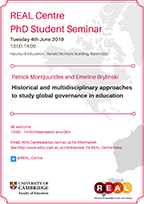
REAL Centre PhD Student Seminar Series - 21st May, Research involving children: Methodological and ethical considerations
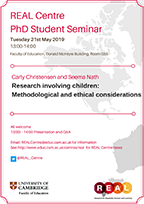
REAL Centre PhD Student Seminar Series, Easter Term, Special Event
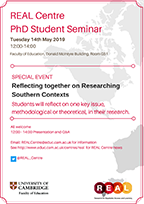
REAL Centre PhD Student Seminar Series, Easter Term, Stephen Bayley and Jwalin Patel

REAL Centre PhD Student Seminar Series, Easter Term - Maria Khwaja and Arif Naveed
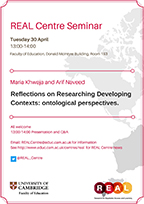
New report on countries failing to deliver on promises made to the world's youngest children
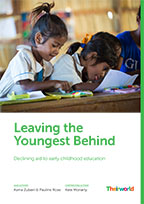
A new report written by Pauline Rose and Asma Zubairi looks at why the world's rich and poor countries are failing to deliver on the promises made to the world’s youngest children, risking their development and future life chances.
To address this imbalance and give all children a fair start in life, governments need to ensure pre-primary education is prioritised and funded in their national education plan, and international donors must ensure no child is left behind by supporting these efforts.
REAL Centre Seminar Series, Lent Term - Caroline Brooks, Syria Projects Manager
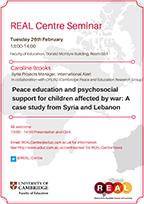
REAL Centre Seminar Series, Lent Term - Panel discussion.
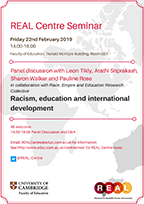
Panel discussion with Leon Tikly, Arathi Sriprakash, Sharon Walker and Pauline Rose
In collaboration with the Race, Empire and Education Research Collective
Racism, education and international development
REAL Centre
Date: Friday 22nd February
Location: Room 1S3, Faculty of Education, Donald McIntyre Building, 184 Hills Road, Cambridge, CB2 8PQ
All welcome - please join us 14:00-16:00
REAL Centre Seminar Series, Lent Term - Dr Matthew Jukes
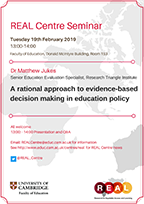
Triangle Institute
REAL Centre Seminar Series, Lent Term - Dr Elena Schmidt, Sightsavers
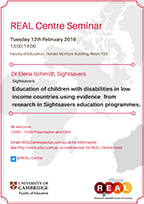
REAL Centre Seminar Series, Lent Term - Professor Erin Murphy-Graham, University of California Berkeley

REAL Centre Seminar Series, Lent Term - Rona Bronwin Education Research Team, DFID
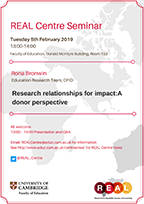
Stronger political leadership needed to close global gender divide in education
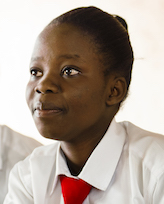
The study, commissioned by the UK Foreign and Commonwealth Office (FCO) and produced by the REAL Centre at the Faculty of Education, University of Cambridge, reveals that the most disadvantaged girls rarely reach high levels of education, beyond primary, that benefit most from national and aid funding. In Nigeria and Pakistan, girls from poor rural households average just one year at school, while rich urban boys enjoy 11 or 12 years of study.
National governments and donor countries must show greater political commitment if global goals on gender equality in education are to be reached, according to the report, 12 Years of Quality Education for All Girls: A Commonwealth Perspective.
Barriers to access
The study highlights an array of barriers that prevent girls accessing education, including gender-based violence within and on the way to school, and absenteeism during menstruation because of a lack of availability of sanitary protection. For marginalised girls, cost is also a key barrier in sending girls to school, with poverty leading some girls to have sex with men who provide them with the essentials of secondary schooling that their family cannot afford. Schools must be made “safe spaces” for girls, particularly in areas affected by conflict, say the authors, while cash support for the poorest families may help ease financial pressures and free up daughters to go to school.
Professor Pauline Rose, Director of the REAL Centre and author of the report, said: “Evidence shows us what works to address barriers that marginalised girls face in their access and learning. Much more needs to be done to implement these interventions at far greater scale. It is vital that current political uncertainties do not jeopardise the prioritisation of investment in girls’ education to enable this to happen.”
The report was commissioned by the Platform for Girls’ Education, co-chaired by the UK Foreign Secretary and Kenyan Cabinet Secretary for Education. The platform, a group of 12 influential figures across the Commonwealth, was created after the Commonwealth Heads of Government Meeting (CHOGM) in April 2018 affirmed the importance of 12 years of quality education for all, particularly marginalised girls. Achieving that target by 2030 is one of the UN Sustainable Development Goals signed up to in 2015 by leaders across the globe.
Equality a “distant reality”
The study finds that, over the past 20 years, considerable progress has been made in increasing access to primary schooling in the 53 countries of the Commonwealth. There are now equal proportions of boys and girls primary enrolled in 31 out of 44 Commonwealth countries with data. But despite this progress, “12 years of schooling remains a distant reality for many of the most disadvantaged girls residing in Commonwealth countries,” the report says. Gender parity in enrolment has sometimes been achieved even though primary schooling is still not universal: in 2017, 137 million primary-and-secondary school aged children were out of school in these countries, approximately half of them girls.
In 15 out of 21 Commonwealth countries with available data, poor rural girls spend no more than five years in school, and so have little chance of making the transition to secondary school. In six countries, they spend only one or two years in education. Children and adolescents affected by conflict are most likely to be out of school, and refugee girls are particularly at risk: they are half as likely as their male counterparts to be in secondary school.
Poor learning in school
Even those children in school are frequently not learning the basics, researchers found. The recently launched Human Capital Index shows that girls’ education fares far worse when years in school is adjusted for whether or not children are learning. In 14 out of the 26 countries with data, girls who are in school are learning only for the equivalent of six years or less. The picture is likely to be even starker for girls in rural areas and those facing other forms of disadvantage.
Disadvantage starts early, the study says, with many girls denied early years investment that is proven to boost educational achievement later. In eight of 14 Commonwealth countries with data, no more than 40 percent of poor rural girls have access to pre-primary education, and in three out of these eight countries, fewer than 10 percent are enrolled.
Governments should do more to target funding on lower levels of education and marginalised groups, the report argues. In 33 out of 45 Commonwealth countries with data, governments are spending far more on post-primary levels of education than on primary schooling, even though the probability of the most disadvantaged girls reaching these levels of education is extremely low. Of the 35 Commonwealth countries with data on pre-primary spending, 25 governments are spending less than five percent of their education budgets on pre-primary education.
Early years not prioritised
The same failure to prioritise the early years is seen in education aid spending. Funding for primary education fell from around two thirds in 2002 to under a half (47%) by 2016, and a mere 0.4 percent of education aid to Commonwealth countries was spent on pre-primary education. By contrast, 10 percent is spent on scholarships to allow students from aid-recipient Commonwealth countries to study in donor countries, even though only the most privileged benefit from such schemes.
In addition, only around five percent of total education aid appears to be spent with the main objective of achieving gender equality. The UK alone bucks the trend, with all but 2% of education aid targeting gender equality directly or significantly affecting it.
To tackle discrimination and work towards gender equality in education, governments of Commonwealth countries must show visible high-level political commitment backed by resources, the study concludes. Funding towards early childhood education and early learning should be prioritised.
Support for girls at puberty
There must also be steps to address the particular challenges marginalised girls face at puberty, such as provision of sanitary pads in schools, and moves to keep girls safe and secure in school, including providing female staff, secure buildings and door-to-door transport between school and home. More broadly, gender-sensitive teaching practices and materials are needed to ensure discriminatory stereotypes are not enforced, says the study.
The report sets out three priorities for further action, including “high-level, visible political leadership” towards gender equality in education, backed up by sufficient resources to reach the most marginalised girls. Investment in early years education is also vital, together with making girls’ education a priority in wider national development planning.
• For more information, contact: Professor Pauline Rose or Faculty of Education Communications Manager Lucy Ward on lw528@cam.ac.uk, tel +44 (0)7788567707
• The report will be launched at the Education World Forum, the world’s largest gathering of education and skills ministers, in London on Monday 21 January 2019.
• The report was commissioned by the Platform for Girls’ Education, co-chaired by the UK Foreign Secretary Jeremy Hunt and Kenyan Cabinet Secretary for Education Amina Mohamed. The Platform, a group of 12 influential figures across the Commonwealth, was launched by the UK government after the Commonwealth Heads of Government Meeting (CHOGM) in April 2018 affirmed the importance of 12 years of quality education for all, particularly marginalised girls. In response to the CHOGM commitment to “leave no girl behind”, the platform aims to drive forward action in the run-up to the organisation’s next meeting in 2020.
• Quality education for all is one of 17 Global Goals that make up the United Nations’ 2030 Agenda for Sustainable Development. In 2015, leaders across the globe committed to ensuring that, 2030, all girls and boys complete free, equitable and quality primary and secondary education.
• Image credit: Eliza Powell/Camfed
REAL Centre Seminar Series, Lent Term - Professor Tony Onwuegbuzie, Wednesday 16th January, 12.30-13.30
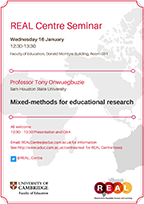
Dr Nidhi Singal was invited to presents at the 5th International conference on Inclusive Education
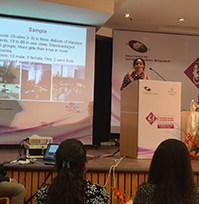
REAL Centre Seminar Series, Michaelmas Term - Dr Leda Kamenopoulou, Tuesday 20th November, 13.00-14.00
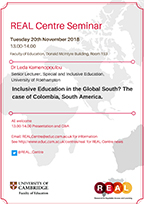
Dr Leda Kamenopoulou
Wrigley Company Foundation supports Indian education scheme evaluated by REAL Cent
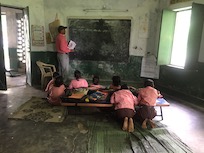
“As we enter the next stage of our partnership with the Wrigley Company Foundation, we continue to be committed to improving the quality of education in India,” said Devyani Pershad, head of program management at Pratham. “The research project has enormous potential to help guide and shape our future strategy for working with children and communities, and we look forward to working with our partners in ensuring its success.”
REAL Centre Seminar Series, Michaelmas Term - Professor Mario Novelli, Friday 16th November, 15.00-17.00
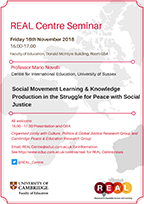
REAL Centre Seminar Series, Michaelmas Term - Dr Ricardo Sabates and Dr Emma Carter, Tuesday 13th November, 13.00-14.00
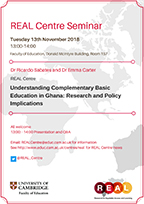
Professor Anna Vignoles named the UK’s most influential researcher on higher education policy.

Anna has advised numerous government departments, including the Department for Education, the Department of Business, Innovation and Skills and HM Treasury. She provided advice to the Browne Review of Higher Education Funding, the House of Commons Education and Skills Committee investigation of higher education funding, the House of Lords Economic Affairs Select Committee, as part of their inquiry into education and training opportunities for young people, and Lord Leitch's Review of Skills.
REAL Centre Seminar Series, Michaelmas Term - Dr Rob Jan Gruijters , Tuesday 6th November, 13.00-14.00
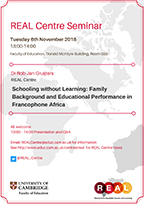
Who benefits from abolishing secondary school fees in Malawi, and what are the costs?
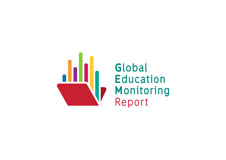
Access to early childhood education (ECE) in rural India
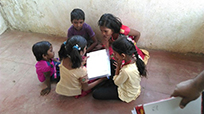
The article, which appears in Compare, was co-authored with colleagues at ASER Centre (Suman Bhattacharjea, Manjistha Banerji, and Punima Ramanujan) and was supported by a Seed Corn grant from the British Association of International and Comparative Education (BAICE). Focusing on the states of Assam, Rajasthan, and Telangana, the authors find that:
Faculty experts to advise on global drive for girls' education
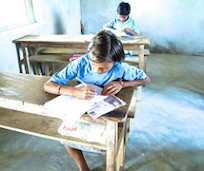
The group of 12 influential global figures, co-chaired by British Foreign Secretary Jeremy Hunt and Kenyan Cabinet Secretary for Education Amina Mohamed, will promote the goal of 12 years of quality education and learning for every girl.
The campaign will continue throughout the UK’s 2018-2020 term as Commonwealth Chair-in-Office, and will focus primarily on the needs of developing countries where marginalised girls are most likely to be missing out on a quality education.
Researchers from the REAL Centre at the Faculty, which pioneers research into overcoming barriers to education, have been chosen to provide reports presenting evidence on the constraints to girls’ education, and on what works to tackle these constraints. The focus will be on on Commonwealth countries, which are home to around half the children out of school globally.
Following the announcement of the campaign by Prime Minister Theresa May at the UN General Assembly, the first meeting of the new Platform took place in New York last week. The initiative will seek to galvanise political will to deliver on commitments to girls’ education made at the Commonwealth Heads of Government Meeting (CHOGM) 2018.
Using evidence from the REAL team and elsewhere, it will highlight examples of best practice to showcase success in girls’ education in order to promote further commitments and action in the run-up to the next CHOGM meeting in Rwanda in 2020. The REAL Centre will produce a report ahead of CHOGM 2020 setting out progress achieved and further action required to meet relevant commitments under the 2030 Sustainable Development Goals.
Professor Pauline Rose, Director of the REAL Centre, said: “It is exciting to see the global momentum around girls’ education, with the Platform represented by influential advocates of education including Julia Gillard, former Prime Minister of Australia and current Chair of the Global Partnership for Education, as well as key female leaders in Commonwealth countries including the President of Trinidad and Tobago, Paula-Mae Weekes, and Ministers of Foreign Affairs from countries such as Ghana and Rwanda.
We hope our reports will give Platform members the evidence they need to translate their strong political commitment into real change for the most marginalised girls who are currently being denied a good quality education.”
• Find a full list of members of the Platform and their biographies here.
REAL Centre Seminar Series, Michaelmas Term - Professor Lant Pritchett, Tuesday 23rd October, 13.00-14.00

Competition launched for young researchers using survey data to explore equity in education
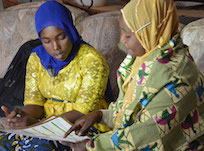
The People’s Action for Learning (PAL) Network has teamed up with the REAL Centre at the Faculty of Education, Cambridge, to launch the 2019 Student Paper Competition in recognition of the outstanding contributions of Master’s and PhD students using Citizen-led Assessment (CLA) data.
The PAL Network is a south-south partnership of 14 countries working across three continents to assess the basic reading and numeracy competencies of all children, in their homes, through annual citizen-led assessments.
The aim of the programme is to find out whether all children are acquiring basic skills - the building blocks of future progress in school – in countries where the information would not otherwise be available. Inclusive and equitable data produced by the assessments is used to inform citizen-led action to improve learning.
The PAL Network is inviting current and recently-graduated Master’s and PhD students to submit their empirical work as an entry into the 2019 Student Paper Competition (deadline 30 November 2018).
Selected authors of the two winning papers will win a fully-funded trip to present their research at the PAL Network biennial conference on 5-6 March 2019 in Islamabad, Pakistan. The conference, titled Ensuring all children learn: lessons on inclusion and equity from the South, is also supported by the REAL Centre.
Dr Ricardo Sabates of the REAL Centre encouraged researchers to enter the student paper competition. He said: “We would like to recognise the talent of early career researchers who use CLA data to investigate educationally relevant topics. These assessments are a powerful tool to help us build a reliable picture of children’s learning and then support citizen-led improvements.”
• Competition entrants should submit a 500-word abstract and full paper (length 6000 words excluding tables, figures and references). Please include your name, your affiliated university, CLA data used and contact details.
• Winners must commit to attend the PAL Network meetings at the conference.
• Submissions should be sent to: REALCentre@educ.cam.ac.uk and conference@palnetwork.org, Please use the subject line Student Paper Competition.
• Entry deadline for the competition is 30 November 2018. The winners will be announced by 15 January 2019.
REAL Centre at the 20th Anniversary BAICE Conference
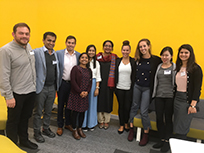
During mid-September 2018, members of the REAL Centre attended the British Association for International and Comparative Education (BAICE) conference held at the University of York. The conference marked 20 years since the formation of BAICE, and provided an opportunity for delegates to reflect on the history and growth of the association, while also discussing the most pressing issues and debates facing comparative and international education today.
Structured around the themes of critique, innovation and transition, the conference panels and symposia combined data from large, representative surveys with smaller, more grassroots studies and interventions to lend multiple perspectives on a range of different topics. REAL Centre attendees discussed their work to increase the reach and voice of sub-Saharan African researchers through the African Education Research Database, and to promote equity and quality through projects such as Research on Improving Systems of Education and Teaching Effectively All Children. REAL partners such as Pratham and ASER further described the complexities of transitioning between primary and secondary education, and the learning trajectories of teenage girls pursuing secondary schooling in India.
Doctoral candidates from the REAL Centre also participated in the conference through chairing sessions and presenting their findings. Students discussed their research on diverse issues including education for refugees and learners with disabilities, and the role of maternal decision-making and financial mechanisms to promote girls’ education and better lives in different contexts. In each case, they were able to benefit from constructive feedback delivered in a supportive and collaborative environment.
Perhaps the most thought-provoking thread running throughout the conference concerned the need to probe and unpick the values that underpin ‘international’ conceptions of education. Keynote speaker Manish Jain challenged the use of deficit language to describe global learning as being in ‘crisis’ and the effect this could have to label millions of children as failures. Instead, he advocated for more localised, decolonised and holistic approaches to education, and shared his experiences of self-designed learning through the Shikshantar Institute and Swaraj University. In a similar vein, Professor Leon Tiklytogether with the REAL Centre’s Dr Arathi Sriprakash and PhD student Sharon Walker prompted delegates to consider the racial subtexts of international education policies and whether leading institutions, agendas and discourse not just undermine indigenous and traditional forms of knowledge but also perpetuate a systemic form of ongoing racism.
After several days of lively discussion and critical reflection, the conference was closed by BAICE’s incoming chair, the REAL Centre’s Dr Nidhi Singal. In her concluding remarks, Nidhi emphasised the need for academics and practitioners to challenge the dominant discourses in education and imagine what the alternatives might be. She highlighted the value of collaboration between different bodies, institutions and disciplines, and the importance of respecting diversity and understanding contexts to achieve more inclusive and effective learning worldwide.
Written by Stephen Bayley, REAL Centre PhD student
Pioneering education scheme boosts learning for poorest Ghanaian children, Faculty research team finds
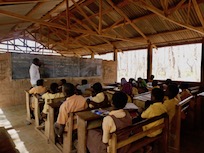
Professor Rose said: “It is exciting to see how evidence is shaping government policy in ways that will increase education opportunities for some of the most vulnerable children in Ghana. The achievements of the CBE programme are striking. In moving forward, it will be vital to tackle the barriers that continue to hold back progress for low-achieving girls.”
• Find out more about the CBE Programme in this short video.
Dr Nidhi Singal to take key role promoting international and comparative education
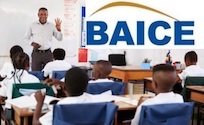
Dr Nidhi Singal, a specialist in educational inequity in South Asia and Africa, has been elected Chair of the leading UK body promoting international and comparative education.
Dr Singal, whose research focuses on the educational experiences of children and young people with disabilities in Southern contexts, was welcomed as Chair of the British Association for International and Comparative Education (BAICE) at the association’s 20th Anniversary conference this month. BAICE is the British affiliate of the World Council of Comparative Education Societies (WCCES), and is committed to promoting research, teaching, policy and development in all aspects of international and comparative education.
Global challenges, including enforced migration through conflict or environmental change, require radical new approaches to providing and understanding education, Dr Singal said.
"In BAICE we are increasingly aware of the need to address new challenges facing education in our times. For example, schooling in the context of forced displacement, addressing the needs of the most marginalised, and the place of education within sustainable development.
These issues take us outside the framework of nation states and the contexts of compulsory formal education that many of us work on, challenge assumptions about the value of education, and the most desirable modes of educational provision. Addressing these issues requires us to seek new ways of thinking, build new knowledge alliances with different disciplinary areas such as philosophy and history to name a few, so that we are not complacent in our intellectual habits."
Speaking at the BAICE conference, Dr Singal said closer engagement was needed between professional bodies and disciplinary areas to further enrich the field of international and comparative education.
She called for a greater focus on 'contexts'. "We need to understand where education happens, but must also keep in mind that when we come into those contexts we understand them through the practices and methodologies of the contexts in which we were trained."
BAICE will continue to encourage Southern scholarship, promote alternative discourses and re-imagine new possibilities for the future of the field, she added, as well as nurturing and building on the spirit of mentorship and guidance for early career researchers which is key to its vision.
REAL Centre Partner Pratham Education wins prestigious prize

REAL Centre at the Global Disability Summit
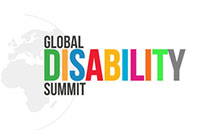
Signed by over 30 organisations, a Statement for Action to 'Accelerate Equitable and Quality Inclusive Education for Children and Youth with Disabilities' was prepared for the Summit. The Statement of Action was a key outcome of a Workshophosted by the REAL Centre and Impact Initiative in April, which built on over a decade’s research on disability and education in Southern contexts undertaken by Faculty members. Download the Statement for Action here.
During the Summit, commitments were made by Ministers of Education and international donors such as DFID, UNICEF and the World Bank to collect data using questions developed by the Washington Group on Disability Statistics. Collection of data using the Washington Group’s Child Functioning Module for the REAL Centre’s Teaching Effectively All Children (TEACh) project (funded by ESRC and DFID) and work done with ASER (Pakistan) shows that many children with disabilities are in mainstream schools in India and Pakistan, but that appropriate strategies are needed to ensure they have the same opportunities to quality, inclusive learning as their peers.
Also at the Summit, the UK Secretary of State for International Development, Penny Mordaunt announced a new Inclusive Education Initiative, together with support from Norway and the World Bank. The Initiative intends to provide technical expertise and resources to countries to help catalyse their progress in reaching children with disabilities through support to inclusive pedagogies and learning environments. The REAL Centre is pleased to have supported Norway and DFID in advising on the framing of the Initiative, in collaboration with the Education Development Trust.
REAL Centre PhD student Julia Hayes was at also at the Summit, using her illustration skills to sum up messages for action and change on inclusive education.
To coincide with the Summit, an opinion piece authored by Nidhi Singal with Nafisa Baboo (Senior Education Advisor, Light for the World) on the need to commit to inclusive education for children with disabilities was published by Devex.
Read more about commitments made at the Summit here.
Global Disability Summit 2018

Read more about evidence to inform the Summit through the ESRC-DFID's Impact Initiative here.
Meeting for the production of the UNESCO Global Report on Adult Learning and Education (GRALE) 4
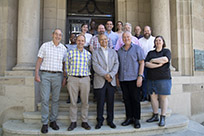
Two REAL Centre Students win education prizes at 2018 Oxford Symposium for Comparative and International Education (OXSCIE).
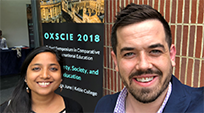
The Oxford Symposium for Comparative and International Education (OXSCIE) 2018 focussed on the complex intersections between education, uncertainty and the changing nature of society.
There was a call for papers in which close to 650 were received; 28 were selected for presentation. Michael Meaney and Meghna Nag-Chowdhuri, PhD students from the REAL Centre were two of the 5 best essay award winners.
Details of their essay’s can be read here.
Paris launch of the online African Education Research Database
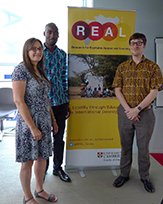
The African Education Research Database, an online curated collection of research conducted by researchers based in sub-Saharan Africa, was launched in Paris on 15 June. To help users quickly identify relevant research, the 2000+ studies in the database are searchable by country, keywords and research methods.
The database results from a partnership between the REAL Centre and Education Sub Saharan Africa (ESSA) which started in June 2017. It aims to raise the visibility and impact of education research from sub-Saharan Africa, and identify priorities and partners for future research. African-based research tends to be ‘overlooked and undervalued’ (Maclure 2006). Yet progress towards global and regional priorities, such as the Sustainable Development Goals and the Continental Education Strategy for Africa, including improving equitable access and learning in the region, requires policy actors to use local evidence as a basis for making informed decisions about policy and practice. .
At the launch of the database, at the offices of the Agence Française de Développement in Paris, Suzanne Grant Lewis, Director of UNESCO IIEP, stated:
“This is a very important contribution which IIEP wants to take full advantage of. It will inform IIEP’s technical support to countries, our policy advising, our training materials, as well of the design of our research. And of course, it will help to identify institutional partners. In our applied research, we want to build on existing work in Africa.”
It is hoped that others working in education in sub-Saharan Africa will also find value in this resource.
Launch of African Education Research Database - raising visibility and impact of African education research
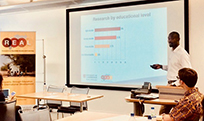
The African Education Research Database is a curated collection of over 2,000 studies from 49 countries in the region. It spans the life-course from early childhood to tertiary education, encompassing the full range of educational themes, from literacy to school feeding.
The database, developed by Pauline Rose, Rafael Mitchell and Samuel Asare, is the result of a fruitful collaboration with the charity Education Sub Saharan Africa (ESSA).
The database launched in Paris on June 15th 2018 at an event hosted by the French Development Agency. The next phase of this project, funded by Jacobs Foundation, will involve synthesising findings from across the research evidence base, and identifying gaps, priorities and partners for future research.
Learning from the PAL Network’s organic and free-range approach to raising learning for the most disadvantaged.
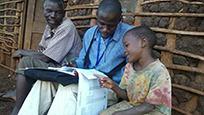
REAL Centre PhD Seminar Series - 5th June, 13.00-14.00
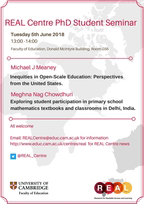
Inequities in Open-Scale Education: Perspectives from the United States. Michael J Meaney
Exploring student participation in primary school mathematics textbooks and classrooms in Delhi, India. Meghna Nag Chowdhuri
Date: Tuesday 5th June 2018
Location: Room GS5, Faculty of Education, Donald McIntyre Building, 184 Hills Road, Cambridge, CB2 8PQ
All welcome - please join us 13:00-14:00
REAL Centre PhD Seminar Series - 29th May, 13.00-14.00
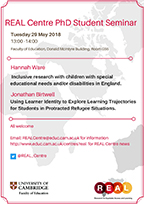
Inclusive research with children with special educational needs and/or disabilities in England. Hannah Ware
Using Learner Identity to Explore Learning Trajectories for Students in Protracted Refugee Situations. Jonathan Birtwell
Date: Tuesday 29th May 2018
Location: Room GS5, Faculty of Education, Donald McIntyre Building, 184 Hills Road, Cambridge, CB2 8PQ
All welcome - please join us 13:00-14:00
REAL Centre PhD Seminar Series - 22nd May, 13.00-14.00
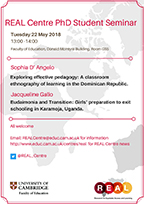
Exploring effective pedagogy: A classroom ethnography of learning in the Dominican Republic. Sophia D'Angelo
Eudaimonia and Transition: Girls’ preparation to exit schooling in Karamoja, Uganda. Jacqueline Gallo
Date: Tuesday 22nd May 2018
Location: Room GS5, Faculty of Education, Donald McIntyre Building, 184 Hills Road, Cambridge, CB2 8PQ
All welcome - please join us 13:00-14:00
REAL Centre PhD student Hiba Salem wins prestigious award.
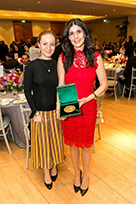
Read the full story here.
Real Centre hosted Pre-Global Disability Summit Workshop

The ‘Pre-Global Disability Summit Workshop on Inclusive Education’(26th-27th April 2018) brought together 35 individuals from key bi- and multi-lateral agencies including World Bank, UNICEF, UNESCO-IIEPP, International Non-Government organisations including Sightsavers, Light for the World, Humanity and Inclusion and Disabled People’s Organisations including United Disabled Persons of Kenya to work together to help inform discussions that will take place at the first the Global Disability Summit to be held in July 2018.
The Summit will be co-hosted by the Department for International Development (DFID, UK) and the International Disability Alliance (IDA). It will bring together global leaders, civil society and the private sector to tackle barriers that prevent people living with disabilities from reaching their full potential. The workshop was funded by the Impact Initiative for International Development and an ESRC Impact Acceleration Award, awarded to Dr Nidhi Singal, Reader in Education at the Faculty of Education, University of Cambridge.
Special seminar by Salman Asim, Education Global Practice, Africa Region, World Bank
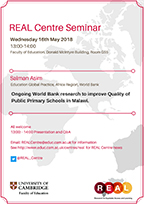
Title: Ongoing World Bank research to improve Quality of Public Primary Schools in Malawi.
Date: Wednesday 16th May 2018
Location: Room GS5, Faculty of Education, Donald McIntyre Building, 184 Hills Road, Cambridge, CB2 8PQ
All welcome - please join us 13:00-14:00
Saffron Walden Walk 2018
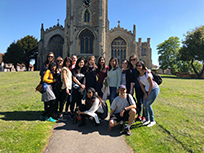
REAL Centre PhD Seminar Series - 15th May, 13.00-14.00
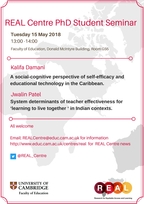
A social-cognitive perspective of self-efficacy and educational technology in the Caribbean. Kalifa Damani
and
System determinants of teacher effectiveness for ‘learning to live together ‘ in Indian contexts. Jwalin Patel
Date: Tuesday 15th May 2018
Location: Room GS5, Faculty of Education, Donald McIntyre Building, 184 Hills Road, Cambridge, CB2 8PQ
All welcome - please join us 13:00-14:00
Dr Ricardo Sabates attended a meeting organised by the MasterCard Foundation in Toronto
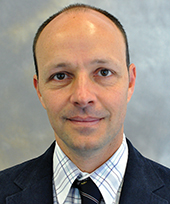
REAL Centre PhD Student Seminar - 24th April 2018
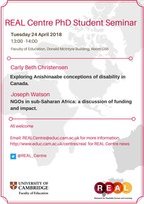
Exploring Anishinaabe conceptions of disability in Canada. Carly Beth Christensen
and
NGOs in sub-Saharan Africa: a discussion of funding and impact. Joseph Watson
Date: Tuesday 24 April 2018
Location: Room GS5, Faculty of Education, Donald McIntyre Building, 184 Hills Road, Cambridge, CB2 8PQ
All welcome - please join us 13:00-14:00
Some of the highlights from the CIES Conference 2018
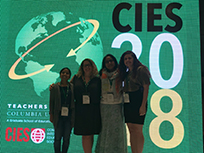
REAL Centre Members at CIES Conference 2018
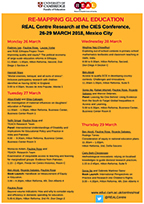
Livestream of REAL Centre Conference
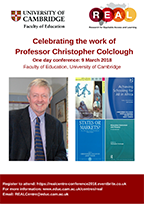
Blog from REAL Centre member Arathi Sriprakash: Let’s talk about racism in education and international development.
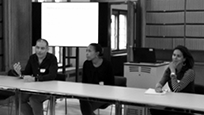
Research Assistant Opportunity
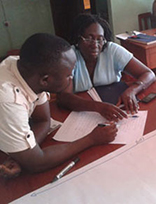
REAL Centre Seminar Series: The potential of the non-state sector: What can be learnt from the PEAS example?
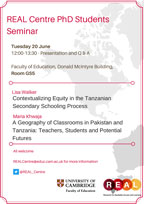
REAL Centre Seminar Lent Term How could education systems research prompt a change to how DIFD works on Education?
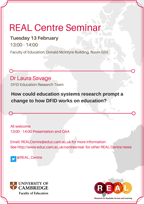
How could education systems research prompt a change to how DIFD works on Education?
Dr Laura Savage DFID Education Research Team
Tuesday 13 February 2018
Faculty of Education, Donald McIntyre Building
Emma Carter travelled to Ghana for the Compulsory Basic Education (CBE) Tracer Study.
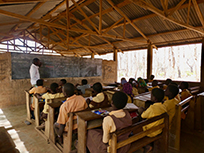
This trip involved piloting the child and household surveys that will constitute the key instruments for data collection. The fieldwork received considerable support from School for Life, one of CBE’s most active implementing partners and was focused in the community of Bogunayili Tingli, in the Kumbungu district of northern Ghana. Encouraging results were achieved from this pilot study; all 25 students from the 2013/2014 academic year were able to be traced with 84% still attending school at either Junior or Senior High School levels.
These preliminary results indicate the significant impact that CBE is having within Ghana and have exceeded initial expectations regarding the educational outcomes of its graduates.
REAL Centre Seminar Series, Lent term 2018: Dr Paul Lynch
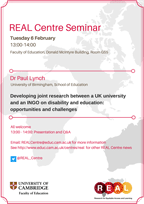
New paper on cost-effectiveness with equity.
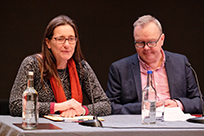
The panel, moderated by BBC education correspondent, Sean Coughlan, together with Lucky Lake, CEO of Camfed and Sinkiwe Makove, highlighted the importance for recognising the higher costs of reaching the most marginalised while identifying this can also result in greater impact.
Read the paper here, co-authored by Ricardo Sabates, Pauline Rose, Marcos Delprato, Ben Alcott with the support of Monazza Aslam and Shenila Rawal.
REAL Centre team attended the release of the ASER 2017 report
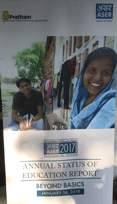
Celebrating the work of Professor Christopher Colclough. One day conference:9th March 2018

A one-day conference celebrating the work of Professor Christopher Colcloughwill take place at the University of Cambridge on 9 March. You can find futher information about the event and sign up on Eventbrite.
REAL Centre Seminar Series. Lent Term 2018
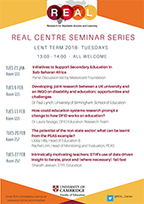
What does the African Education Research Database tell us about research in West Africa?
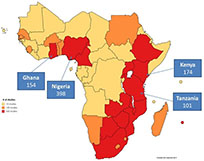
World Innovation Summit For Education - Nidhi Singal and Hannah Ware present report
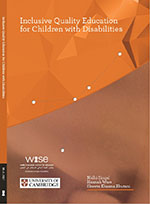
Findings of the report were covered Hindustan Times (a national newspaper in India) and Schools Week (a leading British education newspaper). The Report was also featured on the University of Cambridge's website.
Supporting learner diversity in government schools in Pakistan
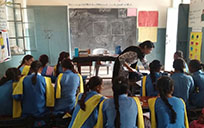
Five day workshop on Inclusive Education and Disability, Haryana
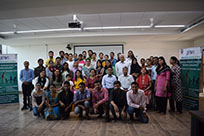
REAL Centre Seminar Series: Professor Anna Robinson-Pant
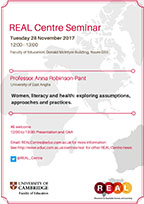
Date: Tuesday 28 November
Location: Room GS5, Faculty of Education, Donald McIntyre Building, 184 Hills Road, Cambridge, CB2 8PQ
Title: Women, literacy and health: exploring assumptions, approaches and practices.
All welcome - please join us 12:00-13:00
See https://talks.cam.ac.uk/talk/index/93496 for more information
REAL Centre informs cross-party report calling for “significant spending” on early-years education

RISE Launch Event in Addis Ababa, October 2017
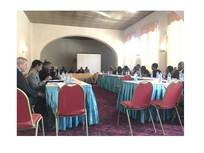
REAL Centre Seminar Series - Michaelmas Term 2017 Hiba Salem & Ray Tangonyire
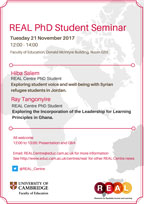
Hiba Salem & Ray Tangonyire
The REAL Centre welcomes you to join us for a seminar with Hiba Salem & Ray Tangonyire, REAL Centre PhD students
Date: Tuesday 21 November
Location: Room GS5, Faculty of Education, Donald McIntyre Building, 184 Hills Road,
Cambridge, CB2 8PQ
Title: Hiba Salem: Exploring Student Voice & Wellbeing with Syrian Refugee Students in Jordan
Ray Tangonyire: Exploring the Incorporation of the Leadership for Learning Principles in Ghana
All welcome - please join us 12:00-13:00
See https://talks.cam.ac.uk/talk/index/93490 for more information
REAL Centre Seminar Series - Dr Paul Atherton
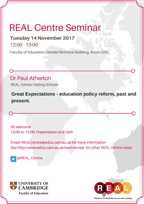
The REAL Centre welcomes you to join us for a seminar with Dr Paul Atherton, REAL Centre Visiting Scholar.
Date: Tuesday 14 November
Location: Room GS5, Faculty of Education, Donald McIntyre Building, 184 Hills Road, Cambridge, CB2 8PQ
Title: Great Expectations - education policy reform, past and present.
All welcome - please join us 12:00-13:00
See https://talks.cam.ac.uk/talk/index/93484 for more information
The missing voice of teachers: evidence from Pakistan
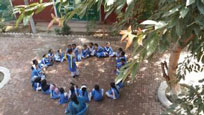
REAL Centre Seminar Series - Professor David Hulme
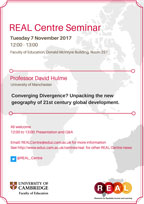
Date: Tuesday 7 November
Location: Room 2S7, Faculty of Education, Donald McIntyre Building, 184 Hills Road, Cambridge, CB2 8PQ
Title: Converging Divergence ? Unpacking the new geography of 21st century global development.
All welcome - please join us 12:00-13:00
See https://talks.cam.ac.uk/talk/index/93478 for more information
School choice in England–who chooses where and why?

REAL Centre Seminar Series Professor Elaine Unterhalter
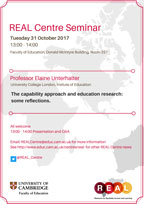
REAL Centre Seminar Series: Professor Nora Groce
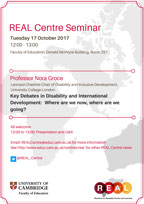
Date: Tuesday 10 October
REAL Centre Seminar Series: Sachin Gathani, Laterite, Rwanda
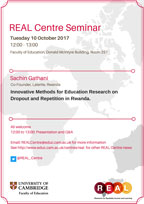
Date: Tuesday 10 October Location: Room 2S7, Faculty of Education, Donald McIntyre Building, 184 Hills Road, Cambridge, CB2 8PQ
Title: Innovative Methods for Education Research on Dropout and Repetition in Rwanda.
All welcome - please join us 12:00-13:00
See https://talks.cam.ac.uk/talk/index/85621 for further information.
REAL Centre Seminar Series - Michaelmas Term 2017
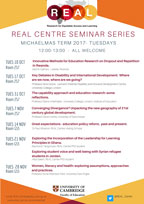
Dr Nidhi Singal takes part in two important events in India
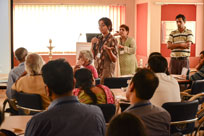
A roundtable discussion was also organised on the 2nd of August at the Department of Education, Savitribai Phule Pune University. There were 15 participants which included university staff members, and doctoral students working in the area of inclusive education, six government school teachers in Pune and district level teacher educators. The discussions drew on insights from TEACh and other research conducted at REAL, experiences of teachers and how these could be brought together to influence change at the teacher education level.
New Members for the RISE team
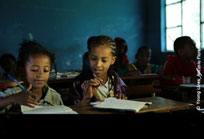
Dr Padmini Iyer is a Research Associate from Oxford, and Louise Yorke is a researcher from Trinity College Dublin. Anita Menon-Harding has joined the team to provide Research Support.
A new database to raise the visibility & impact of African education research.
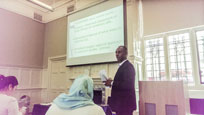
Professor Pauline Rose and Dr Ricardo Sabates travel to Ghana to discuss research results
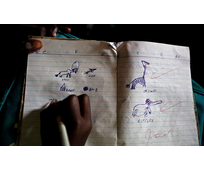
Dr Ricardo Sabates receives prestigious award

A new blog for the Global Education Monitoring Report

The blog looks at the impact a paper just published on Liberia's high profile 'Partnership Schools for Liberia' (PSL) experiment has on education reform and what can be learned from it.
Two articles about REAL Centre student Aliya Khalid's research
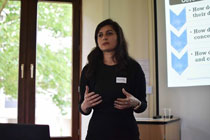
Who benefits from public spending on higher education in South Asia and sub-Saharan Africa? by Dr Sonia Iile and Professor Pauline Rose

Memorial service for Professor Christopher Colclough
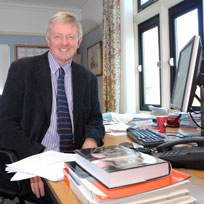
The REAL Centre at UKFIET Conference 2017
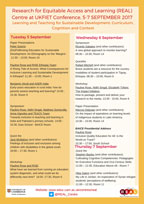
British Academy Mid-Career Fellowship for Dr Sriprakash
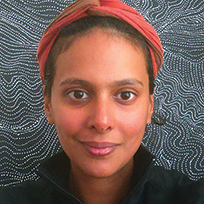
Arathi Sriprakash's project is called 'The contested science of education and international development: concepts and politics in Indian schooling, 1947-1968'. It examines the politics of knowledge in education and international development. Focusing on mass primary education in India, she will trace how scientific knowledge about schooling and society was produced, circulated, and legitimised in the two decades after Indian independence.
Further information
Mapping education research in sub-Saharan Africa
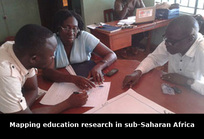
Professor Anna Vignoles elected to the British Academy
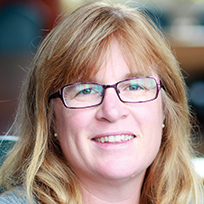
Further details.
A report by REAL Centre members: How financing pre-primary education gives every child a fair start in life

REAL Centre Members contribute to the 2016 Nestle Foundation Report
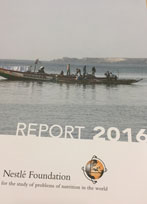
Improving Ethiopia’s Education System

http://www.riseprogramme.org/content/what-will-it-take-raise-learning-outcomes-all-children-ethiopia-translating-commitment
MPhil students in Education, Globalisation and International Development celebrate the end of the programme
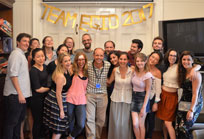
Dr Ricardo Sabates travelled to Ghana to discuss the Complementary Basic Education Programme

REAL Centre Conference - Inclusive learning and teaching: Lessons from the last two decades
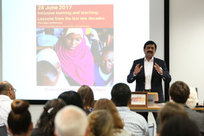
The event was in association with the British Association for International and Comparative Education (BAICE).
You can view the conference here and you can also join in the discussion via Twitter #REALTeach
UK educators and young people who recently experienced terror
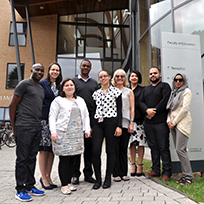
This project has been funded by the Cambridge Africa Alborada Fund. It brings together teachers working with young people in Holte Secondary School in Birmingham and Panyadoli Secondary School in Kiryandongo District, Uganda.
Full details at the Faculty academic group: Education, Equality and Development
New REAL Centre research programme on education systems in Ethiopia
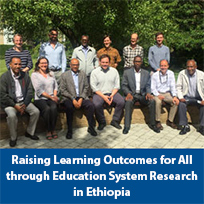
Part of the DFID-funded Research on Improving Systems of Education (RISE) programme, the large-scale research programme of around £4 million over five years will aim to assess rigorously the implementation and impact of activities associated with a major education quality reform programme in Ethiopia, with a focus on the most disadvantaged.
REAL Centre Seminar: Fernando M.Reimers Ford Foundation Professor of the Practice in International Education Harvard Graduate School of Education
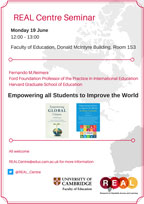
Date: Monday 19 June
The REAL Centre PhD Student Seminar: Maria Khwaja and Lisa Walker

Date: Tuesday 20 June
Location: Room GS5, Faculty of Education, Donald McIntyre Building, 184 Hills Road, Cambridge, CB2 8PQ
Title: A Geography of Classrooms in Pakistan and Tanzania: Teachers, Students and Potential Futures - Maria Khwaja
Contextualizing Equity in the Tanzanian Secondary Schooling Process - Lisa Walker
All welcome - please join us 12:00-13:30
Presentation and Q&A
See http://talks.cam.ac.uk/talk/index/72656 for further information.
The REAL Centre PhD Student Seminar: Stephen Bayley and Asma Zubairi
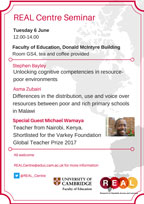
Date: Tuesday 6 June
Location: Room GS4, Faculty of Education, Donald McIntyre Building, 184 Hills Road, Cambridge, CB2 8PQ
Title: Unlocking cognitive competencies in resource-poor environments - Stephen Bayley and Differences in the distribution, use and voice over resources between poor and rich primary schools in Malawi - Asma Zubairi
All welcome - please join us 12:00-14:00 - Presentation and Q&A
See http://talks.cam.ac.uk/talk/index/72654 for further information.
First LEGO Professor of Play in Education, Development and Learning
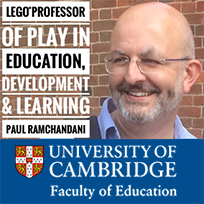
The University of Cambridge has appointed a world-leading researcher as the first LEGO Professor of Play in Education, Development and Learning.
The Centre for Research on Play in Education, Development and Learning (PEDAL) was established in 2015 with a £4 million grant from the LEGO Foundation which also funded the leadership role which will be taken up by Professor Paul Ramchandani.
REAL Centre PhD Student Seminar:Rebecca Gordon and Lauren Marston
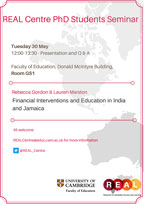
Date: Tuesday 30 May
Location: Room GS1, Faculty of Education, Donald McIntyre Building, 184 Hills Road, Cambridge, CB2 8PQ
Title: Financial Interventions and Education in India and Jamaica - Rebecca Gordon & Lauren Marston
All welcome - please join us 12:00-13:30 - Presentation and Q&A
See http://talks.cam.ac.uk/talk/index/72654 for further information.
The REAL Centre Seminar with Sahar Shah and Janice Kim, PhD students.
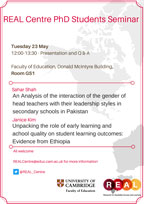
Date: Tuesday 23 May
Location: Room GS1, Faculty of Education, Donald McIntyre Building, 184 Hills Road, Cambridge, CB2 8PQ
Titles: An Analysis of the Interaction of the gender of head teachers with their leadership styles in secondary schools in Pakistan - Sahar Shah
Unpacking the role of early learning and school quality on student learning outcomes: Evidence from Ethiopia - Janice Kim
12:00-13:30 - Presentation and Q and A
See http://talks.cam.ac.uk/talk/index/72653 for further information.
REAL Centre Seminar:Aliya Khalid and Seema Nath, PhD students, REAL Centre
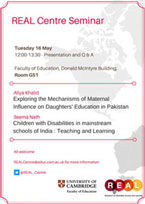
Date: Tuesday 16 May
Location: Room GS1, Faculty of Education, Donald McIntyre Building, 184 Hills Road, Cambridge, CB2 8PQ
Title: Exploring the Mechanisms of Maternal Influence on Daughters' Education in Pakistan - Aliya Khalid and Children with Disabilities in mainstream schools of India: Teaching and Learning - Seema Nath
All welcome - please join us
12:00-13:30 - Presentation and Q
See http://talks.cam.ac.uk/talk/index/72650 for further information.
Toor Pekai Yousafzai spoke about her role as mother to daughter Malala
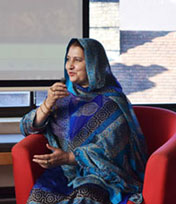
REAL Centre Seminar Series, Easter Term 2017
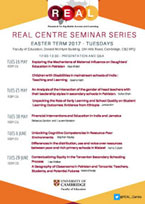
A blog by REAL Centre members: Mobilizing the power of volunteers through citizen led assessments
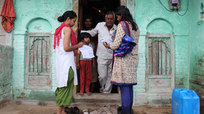
REAL Centre evidence in International Development Committee’s report on Education
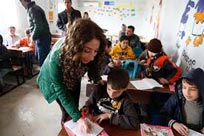
Oral and written evidence from the REAL Centre has been drawn on by the UK International Development Committee (cross-party committee of MPs).
In a letter to the Secretary of State for International Development, Priti Patel MP, published yesterday in lieu of a final report due to the upcoming election, the Committee highlights the importance of increasing investment in education to ensure no one is left behind.
Professor Pauline Rose, on behalf of the REAL Centre, joined other expert witnesses during the Committee’s enquiry on education. Drawing on evidence from the REAL Centre’s work, she highlighted the critical issue of investing in early years education in order for disadvantaged children and young people to realise their potential in adulthood.
Professor Rose was quoted in the letter as saying,"the evidence is quite clear that an early childhood development programme makes a huge difference to their readiness to learn once they are in school and has greater benefits once they go through the system, particularly for the most marginalised ".
Drawing on the REAL Centre’s Teaching Effectively All Children research programme, Professor Rose was also cited as arguing that efforts should be on ensuring the most disadvantaged " have the best teachers, the most qualified teachers and teachers who have been given training in how to teach basic literacy and numeracy ". She also emphasised the need for teachers to be trained in inclusive teaching practices, to ensure they can deal with diverse groups of children in the classroom and ensure children are not left behind once they reach the classroom, including those with disabilities.
The IDC letter further highlighted the REAL Centre’s attention to focusing on the transition from primary to secondary school, where there are large numbers of dropouts and on the most marginalised children, particularly girls and those with disabilities. The REAL Centre is currently working with Camfed to assess Value for Money with an equity lens in its girls’ education programme in Tanzania, a programme which the Committee recognised as achieving unprecedented learning outcomes among the most marginalized girls.
How educational research can better engage with policy making, both within the UK and international development.
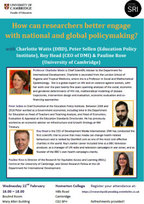
The event, hosted in collaboration with Cambridge Public, was chaired by Professor Anna Vignoles, Professor of Education (1938) at the University of Cambridge. The invited speakers were:
Professor Charlotte Watts, Chief Scientific Adviser to the Department for International Development, and Director of the Research and Evidence Division.
Peter Sellen, Chief Economist at the Education Policy Institute.
Roy Head, CEO of Development Media International, an NGO using mass media to change health-related behaviours in the global South.
Professor Pauline Rose, Director of the Research for Equitable Access and Learning (REAL) Centre at the University of Cambridge, and Senior Research Fellow at the UK Department for International Development.
Watch a video of the event.
Country-level theories of change: From Assessment to Action
.jpg-createdByNewsInterface-03_04_2017__1509)
The PAL Network comprises of thirteen organisations from South Asia, Africa and Latin America conducting citizen-led assessments of learning outcomes. Centred around the theme Poder para la Gente (Power to the people), this annual meeting focused on strengthening the network and the work of its members by evaluating the issues and challenges facing them and discussing opportunities to move beyond assessment into conducting educational interventions.
The REAL Centre delegation had the opportunity to participate in plenary discussions and working group meetings, as well as interview delegations from 16 different countries for their ongoing research. They also conducted field visits to observe educational interventions in Naolinco, Tuxtlas, Chiconquiaco and Sihuapan.
Job opening: Mapping education research in Africa

The postholder will work under the direction of Professor Pauline Rose.
Applicants must hold a PhD in a relevant subject area; have excellent skills in research in particular analysis of literature; an ability to critically review reports and other documents, and to prepare drafts of reports emerging from this analysis to a high standard. A broad-based understanding of education in Sub-Saharan Africa, and an ability to read French are also desirable.
For full details of responsibilities of the post, and the person specification please see the Further Particulars for the post.
Fixed-term: The funds for this post are available for 12 months in the first instance. To apply online for this vacancy and to view further information about the role, please visit: http://www.jobs.cam.ac.uk/job/13304. This will take you to the role on the University’s Job Opportunities pages. There you will need to click on the 'Apply online' button and register an account with the University's Web Recruitment System (if you have not already) and log in before completing the online application form.
We hope to hold interviews during the week commencing 8 May 2017. Informal enquiries can be addressed to Professor Pauline Rose (pmr43@cam.ac.uk)
Please quote reference JR11808 on your application and in any correspondence about this vacancy. Closing date: 30 April 2017
The Comparative and International Education Society’s 2017 conference
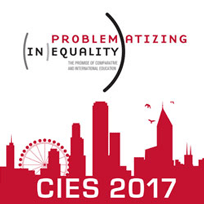
The Comparative and International Education Society held it's 2017 conference, Problematizing Inequality: The Promise of Comparative and International Education, in Atlanta, USA, 5-9 March.
Dr Ben Alcott presented research from the REAL Centre, first in a panel session with members of ASER India on early childhood education opportunities in rural India, then by co-hosting a workshop on measuring education equity alongside members of the UNESCO Institute for Statistics, FHI 360, and Oxford Policy Management.
In addition, Rachel Hinton, Leader of the Department for International Development's Education Research Team, presented work from the REAL Centre's Teaching Effectively All Children project as exemplary of the role that mixed methods projects can play in advancing knowledge on how to improve learning opportunities for the most disadvantaged children.
Lent Seminar: Arif Naveed, PhD student, REAL Centre - Intergenerational transmission of educational inequalities in rural Pakistan
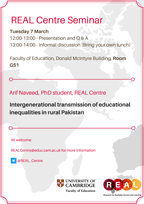
The REAL Centre welcomes you to join us for a seminar with Arif Naveed, PhD student, REAL Centre.
Date: Tuesday 7 March
Location: Room GS1, Faculty of Education, Donald McIntyre Building, 184 Hills Road, Cambridge, CB2 8PQ
Title: Intergenerational transmission of educational inequalities in rural Pakistan.
All welcome - please join us
12:00-13:00 - Presentation and Q & A
13:00-14:00 - Informal discussion (Bring your own lunch)
See http://talks.cam.ac.uk/talk/index/70752 for further information.
Seminar: Lucy Lake, CEO, Camfed - Camfed's experience in positioning data to inform programming
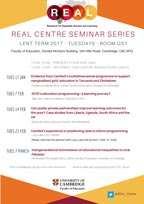
Date: Tuesday 21 February
Location: Faculty of Education, Donald McIntyre Building, GS1;
Title: Camfed's experience in positioning data to inform programming.
All welcome - please join us for the presentation and QandA from 13:00 to 14:30.
See http://talks.cam.ac.uk/talk/index/70751 for further information.
"A girl without education is nothing in the world"
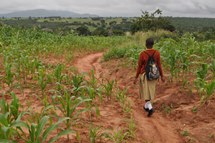
We see girls education as the starting point to everything from tackling poverty and early mortality through to driving economic development it generates a multiplier effect like no other. (Lucy Lake, CEO of Camfed)
The article looks at the challenges faced by adolescent girls like Catherine, Husna and Vumilia in Tanzania, and the importance of tackling the whole range of barriers girls from poor backgrounds face, including changing the conditions within which they learn.
Through analysis of Camfed quantitative and qualitative program data from Zimbabwe and Tanzania, the REAL Centre has already established how beneficial Camfed holistic support program is. But we also need to assess why, and how this can be replicated across an education system, says Professor Rose, whose teams research informs policy makers and international finance bodies, among others.
Read the feature article: "A girl without education is nothing in the world."
Photo: Camfed/P. Hayes
PEDAL Acting Director supporting PlayLabs in Bangladesh
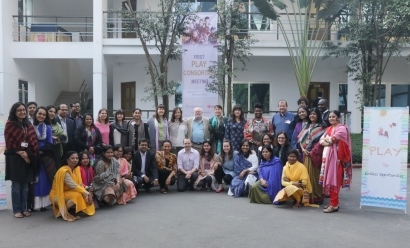
Eighty 'Playlabs' have been set up in Bangladesh, Uganda and Tanzania, funded by the LEGO Foundation, alongside training for playleaders.
David will be leading a research sub-committee working over the next 2-3 years to support the development of the PlayLabs and to conduct research to establish their effectiveness in providing high quality pre-school education.
Applications now open for the Sutton Trust Summer School in Education, Policy & International Development

Dr Marcos Delprato's seminar focussed on learning what keeps the most marginalized girls in school
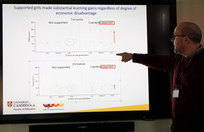
More information about his seminar can be found here
Photo:Camfed/A Adams
The Education Commission's #Learning Generation: Putting Evidence to Work presentation and discussion is available to watch online
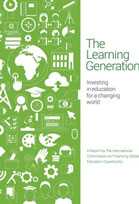
If you were unable to attend, the event is now available online by clicking here.
Education access problem ‘is poverty' (Times Higher Education)
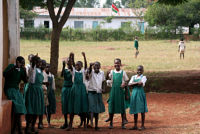
'We need to keep on focusing on gender inequalities, but it is clear that the gaps in educational outcomes are far larger when you compare different income groups,' Dr Ilie told Times Higher Education.
The full article is available on the Times Higher Education website.
The Education Commission: #LearningGeneration: Putting Evidence to Work
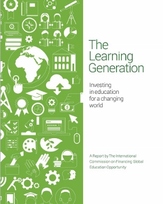
The International Commission on Financing Global Education Opportunity (The Education Commission) was set up in 2015 to reinvigorate the case for investing in education and ensure all children and young people have the opportunity to gain the skills they need for adulthood and work in the 21st century. Chaired by Gordon Brown, the Commission brings together an illustrious group of leaders including former heads of state and government, Nobel Laureates, leaders from business, economics, health, education and other sectors. In September 2016, The Commission launched a bold, evidence-based plan to create the Learning Generation. Drawing on the world's best research and policy analysis, the Learning Generation report sets out an agenda for action to get all young people into school and learning within a generation to create the largest expansion of educational opportunity in history.
Presentation from: Liesbet Steer, Director of Research of the Education Commission.
Discussants will respond to the key recommendations of the Learning Generation report:
Luis Benveniste, Practice Manager Education, Global Engagement and Knowledge, World Bank
Rachel Hinton, Head, Education and Research Team, Department for International Development
Olav Seim, Policy Director Education, Norwegian Ministry of Foreign Affairs
Moderator: Pauline Rose, REAL Centre, Faculty of Education, University of Cambridge
CLICK HERE FOR TICKETS
Donald McIntyre Building, Faculty of Education, 184 Hills Road, Cambridge, CB2 8PQ, Room GS5.
Dr Marcos Delprato's seminar
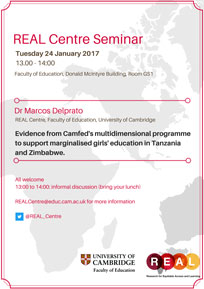
Universities must contribute to fighting inequality

Teaching in conflict zones
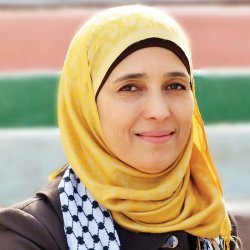
"The role of education for refugee children is not only to teach them to read and write", said Hanan Al Hroub, "but also to help them deal with what they have experienced".
Blog: BOLD - Reducing learning inequalities matters in closing health gaps

Dr Sabates writes about his research in the areas of education and international development - both on the wider benefits of education and on the role of education in reducing inequalities.
REAL Centre papers for the #LearningGeneration

You can now view our papers online (under the 'Inclusion' tab)
Overcoming Inequalities Within Countries to Achieve Global Convergence in Learning
Pauline Rose, Ricardo Sabates, Ben Alcott and Sonia Ilie
Targeted, Multidimensional Approaches to Overcome Inequalities in Secondary Education: Case Study of Camfed in Tanzania
Ben Alcott, Pauline Rose and Ricardo Sabates
Education in Development Agenda of Pakistan
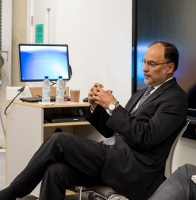
- People first - investment in social and human development
- Sustained and inclusive growth
- Democratic governance and institutional reforms
- Ensuring security of food, water and energy
- Promoting entrepreneurship and private sector
- Developing a competitive knowledge economy through value addition
- Modernizing transport infrastructure and regional connectivity
Given the youth bulge, upcoming economic opportunities resulting from greater regional integration, and the emerging needs of economic growth, education is central to the development agenda of Pakistan. In order to achieve the goals of the Vision 2025, Iqbal highlighted the need for greater investment in higher education aimed both at improving access and quality. He explained his government's aim to establish a university campus in each district, creating a demand for 30,000 PhDs in the near future for teaching and research roles. Most of the need for human resources, added the minister will be met by the 'US-Pakistan knowledge corridor' under which 10,000 Pakistanis will be trained for PhDs in various disciplines in the next few years. He also talked about the initiatives taken to strengthen research at universities and the development of university-industry linkages.
Ahsan Iqbal highlighted that the provision of schooling is the responsibility of provinces after the 18th Constitutional Amendment. However, the Federal Government considers the need for greater coordination between the provinces in order to ensure a higher quality of education. The Federal Government particularly wants to help provinces to improve curricula, set up teachers' training facilities and strengthen learning assessments. Iqbal expressed interest in collaborating with the Faculty of Education particularly on teachers' training and improving learning assessment.
Seminar: Dr Shailaja Fennell - Capability approach and relevance for understanding the provision & publicness of education

Date: Tues 29 Nov
Location: Faculty of Education, Donald McIntyre Building, GS1
Title: Capability approach and relevance for understanding the provision and publicness of education
All welcome - please join us for the presentation and QandA from 12:30 to 13:30 followed by an informal discussion from 13:30 to 14:00 (bring your lunch).
See http://talks.cam.ac.uk/talk/index/68540 for further information.
Background Paper - Supporting primary and secondary education for refugees: the role of international financing
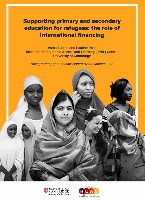
Commissioned by the Malala Fund, 'Supporting primary and secondary education for refugees: the role of international financing' has been released and is available to read online.
This paper presents how the disrupted education of many children who have been forced to flee conflict and other crises to neighboring countries has meant that their education lags far behind that of their non-refugee peers. It goes on to consider in more detail the experiences of five of the ten largest refugee-hosting countries in the world, and the extent to which children and adolescents have been able to access education, with a particular focus on girls. Lastly the paper considers current trends in international development and humanitarian finance in providing education to refugee children and adolescents in the context of conflict.
Vacancy: RA for Country-level theories of change: from Citizen-led Assessment to Action

The purpose of this study is to describe and document variations of the theory of change of the citizen-led assessments within specific country contexts, and to generate knowledge through case studies about how the citizen-led assessments of learning have motivated or contributed to ongoing efforts at making education service delivery more effective and responsive to people's needs in particular country contexts. The postholder will work under the direction of Professor Pauline Rose, Dr Ben Alcott and Dr Ricardo Sabates to carry out a review of literature around uses of theories of change; and interviews to gain further understandings into the role of theories of change for citizen led assessments of learning; and conduct case studies. The postholder will support the production of user-friendly synthesis reports as well as
academic papers, and will be producing and sharing materials to support the goals of the People's Action for Learning (PAL) Network.
Applicants must hold a BA 2:1 degree (for Research Assistant) or a PhD (for Research Associate) in a relevant subject, and have relevant qualitative research training and experience. Ideally, you should also have a strong understanding of theory of change and some knowledge of citizen led assessments. You should also demonstrate evidence of drafting reports, producing user-friendly summaries, and contributing to writing for publication.
For full details of criteria for appointment and duties of the post at the different levels please see the Further Particulars for the post.
Fixed-term: The funds for this post are available until 29 December 2017 in the first instance.
To apply online for this vacancy and to view further information about the role, please visit: http://www.jobs.cam.ac.uk/job/12232. This will take you to the role on the University's Job Opportunities pages. There you will need to click on the 'Apply online' button and register an account with the University's Web Recruitment System (if you have not already) and log in before completing the online application form.
Informal enquiries may be made to Professor Pauline Rose (pmr43@cam.ac.uk)
Interviews will be held on either 16 or 19 December 2016.
Please quote reference JR10828 on your application and in any correspondence about this vacancy.
Closing date: 9 December 2016
Roundtable on Teaching, Learning and Disadvantage in Lahore
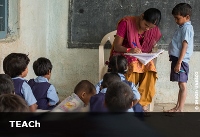
Policy dialogue: Teaching, Learning and Disadvantage
Date: Tuesday, 22nd November 2016
Venue: 19-A, FCC, Gulberg IV, Lahore
Timing: 9 AM - 2 PM (followed by lunch)
This dialogue will to gather and engage with stakeholders to understand ways in which research can inform education policy for improving learning for marginalised groups.
The objective of the dialogue is twofold:
1. Communicate emerging evidence on quality of teaching for raising learning outcomes for all children;
2. Learn from stakeholders on evidence available and further evidence needed:
a) Identify data available for understanding gaps in learning and effectiveness of teaching;
b) Identify how data on learning is being used to inform school, community and national level strategies on addressing disadvantage
c) Provide opportunities for policy makers and practitioners to raise questions in relation to these issues
Participants at the round table will include representatives of the department of education, teachers, donor organizations working in Pakistan, policy researchers, and representatives of NGOs working in the education delivery space.
Seminar: Dr Ben Alcott, Early childhood education in rural India
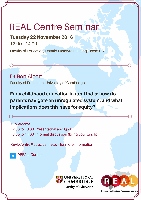
Date: Tues 22 Nov (Today)
Location: Faculty of Education, Donald McIntyre Building, GS1
Title: Early childhood education in rural India: how do parents navigate an unregulated system, and what implications does this have for equity?
All welcome - please join us for the presentation and QandA from 12:00 to 13:00 followed by an informal discussion from 13:00 to 14:00 (bring your lunch).
See http://talks.cam.ac.uk/talk/index/68539 for further information.
REAL Centre seminar with Professor Ahsan Iqbal on Education in the Development Agenda of Pakistan
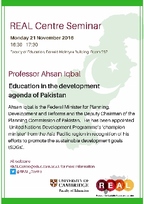
Professor Ahsan Iqbal is the Federal Minister for Planning, Development and Reforms and the Deputy Chairman of the Planning Commission of Pakistan. He has been appointed United Nations Development Programme's 'champion minister' from the Asia Pacific region in recognition of his efforts to promote the sustainable development goals (SDGs).
Venue: Faculty of Education, Donald McIntyre Building, Room 2S7
Date and Time: Monday 21 November at 16:30
For more information, see talks.cam.ac.uk/talk/index/69219
Lahore Policy Exchange: Making Quality Education Inclusive for all Children
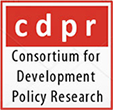
Professor Pauline Rose will speak on 'Inclusive education around the world: Challenges and strategies' as part of this exchange.
Seminar: Is the African School in the 21st Century still an enemy of the farm?
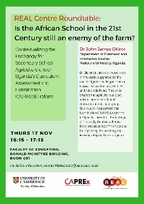
Date: Thurs 17 Nov, 16:15 (today)
Location: Faculty of Education, Donald McIntyre Building, GS1
Title: Is the African School in the 21st Century still an enemy of the farm?
Dr Okiror (Department of Extension and Innovation Studies, Makerere University, Uganda) will provide an overview of this study, supported by the Cambridge Africa Programme for Research Excellence (CAPREx) and Alborada Fund. This paper situates the agriculture subject within the African schools’ contexts and on the ongoing Curriculum, Assessment and Examination (CURASSE) reforms in Uganda. Based on the findings of the study, the research team have proposed recommendations for improving the teaching and learning of agriculture in Uganda.
All welcome. See http://talks.cam.ac.uk/talk/index/69136 for further information.
REAL Centre to host Varkey Foundation Global Teacher Prize Winner, Hanan Al Hroub
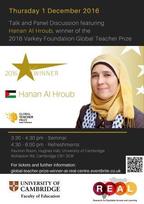
Venue: Pavilion Room, Hughes Hall, Wollaston Road, Cambridge, CB1 2EW
For tickets and further information: global-teacher-prize-winner-at-real-centre.eventbrite.co.uk
15.30-16.30: Seminar
16.30-18.00: Refreshments
University of Cambridge Pro Vice Chancellor for Institutional and International Relations, Professor Eilis Ferran, will open the event after which Hanan Al Hroub will speak about her work, notably with respect to teaching for peace. This will be followed by a panel discussion to include Philippa Lei, Director of Advocacy and Programmes at the Malala Fund, whose work champions education for adolescent girls in refugee settings, moderated by Pauline Rose, Director of the REAL Centre and Professor of International Education.
Pauline Rose presents at All Party Parliamentary Group on Global Education for All
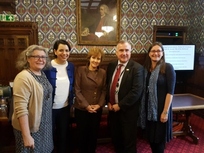
REAL Centre contributes to the case for disability-responsive education financing
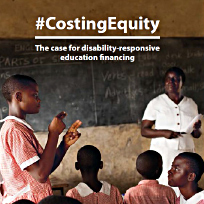
Dr Nidhi Singal was part of the Steering Group appointed to work on this Report. The blog Loosening the purse strings: financing the education of children with disabilities in India highlights some of the key issues in this field.
REAL Centre Seminar: Professor Rachel Sabates-Wheeler, IDS
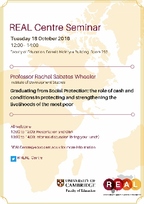
Speaker: Professor Rachel Sabates-Wheeler from the Institute of Development Studies
Title: Graduating from Social Protection: the role of cash and conditions in protecting and strengthening the livelihoods of the most poor
All welcome - please join us for the presentation and Q&A from 12:00 to 13:00 followed by an informal discussion from 13:00 to 14:00 (bring your lunch).
Nidhi Singal presents evidence on Inclusive Quality Education to Council of Europe
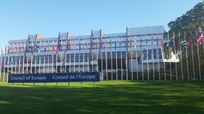
In her presentation, Nidhi drew on insights from research programmes underway at the REAL centre, and set out a six point agenda for action towards developing inclusive equality education systems, underpinned by a focus on Rights, Resources and Research.
BBC: UN says 69 million teachers needed for global school pledge
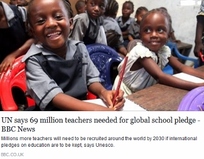
The article hightlights the '..acute pressure in sub-Saharan Africa, where countries would need to train another 17 million teachers to meet the demand.'
The article quotes Pauline Rose of the REAL Centre who explains the nature of the challenge as it relates to class size, a lack of secondary school graduates to fill the teaching void, and the need to understand regional shortages.
She is also quoted on the problem of low pay in some countries in sub-Saharan Africa where teachers are "paid below the poverty line, and so not surprisingly they take second jobs to compensate. This has an impact on the quality of their teaching".
Click on this link to read the full article.
REAL Centre members to present at the 'What Works Global Summit'

REAL Centre members will present tomorrow, Tuesday 27 September at 9:30 at George Fox, Friends House, leading the panel 'Promoting policy through evidence to achieve the education Sustainable Development Goal: The importance of a focus on early learning (PS 4.2)' as part of the Education theme at #WWGS2016. If you are at the conference, we look forward to seeing you there; if not, be sure to follow us on twitter.
Blog: The paradox of disability and education in India
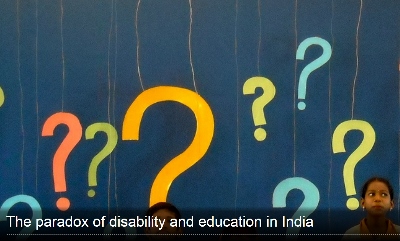
Their blog highlights some of these contradictions through reflection on discussions at a recent consultation in New Delhi on 'Teaching Learning and Disadvantage' organised by Collaborative Research and Dissemination (CORD) on behalf of the Impact Initiative. They also draw on fieldwork experience as part of Teaching Effectively All Children (TEACh) research.
Anuradha De is Director of Collaborative Research and Dissemination (CORD), a country partner for the REAL Centre's TEACh project. Dr Nidhi Singal is Senior Lecturer in Inclusive Education at the Faculty of Education, and a member of the REAL Centre.
Education's missing priorities
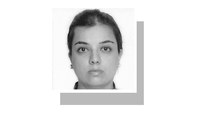
Dr Malik refers to the consultation she attended on teaching, learning and disadvantage hosted by Collaborative Research and Dissemination in New Delhi, India, at which these priorities were emphasised.
The collection of evidence linking disadvantage, teaching strategies and learning outcomes as in the REAL Centre's 'Teaching Effectively All Children (TEACh) project can support policy reform for 'greater inclusivity in school'.
Dr Rabea Malik is a research fellow at the Institute of Development and Economic Alternatives (IDEAS), a country partner for the REAL Centre's TEACh project.
A Times Higher Education article highlights the work of Sonia Ilie and Pauline Rose
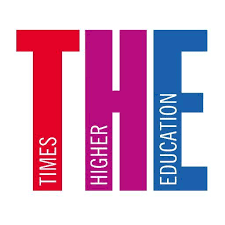
Times Higher Education quote Pauline Rose: 'Despite recent expansion in higher education in African countries, the evidence shows that the poorest young people in African countries are very rarely getting access...As higher education expands, there is also some evidence to suggest that gaps in access to higher education between young women and men widen in these countries."
You can read the complete Times Higher Education article and the Higher Education journal article.
#LearningGeneration Report just released!

To give some examples of our findings included in the Report:
- the need to focus on wide education gaps within countries: analysis of 48 countries with learning data showing the average gap between the chances of the richest and the poorest children achieving primary-level maths skills is 20 percentage points: 55 percent of the richest children learn the basics, while only 34 percent of the poorest do so
- completion of primary school continues to be very unequal: the average gap between the chances of the richest and the poorest children completing primary school is 32 percentage points
- the importance of assessing multidimensional disadvantage: in rural India, there is a 20 percentage-point gap in rates of learning between poorer and wealthier children. Add the impact of gender, mother's education, and regional disparities, and the gap rises to 80 percentage points
- strategies targeting such multiple disadvantages can make a difference: our assessment of Camfed's multi-pronged programme targeting marginalized adolescent girls in Tanzania shows that those receiving Camfed support almost triple their scores on learning assessments compared to those who do not.
- the rich benefit far more than the poor from public education spending: our analysis of 31 countries shows that the ratio of public education spending on the richest versus on the poorest gets larger the higher the level of education.
- poor households not only benefit less from public spending, but are also likely to pay more through regressive tax systems: in more than half of low- and lower-middle-income countries, at least 40 percent of tax revenue is collected from regressive indirect taxes
- aid to education is also skewed towards the rich: just 68 percent of education aid actually reached recipient countries in 2014; in part because close to 70 percent of aid to higher education is spent on scholarships for students studying in donor countries which primarily benefits those from rich households
- aid donors could do more to support mobilization of domestic resources: only 0.07 percent of total ODA has been allocated as support for tax policy and administration, despite evidence that such support can help to deliver far greater tax revenues.
Read the full Report here.
UNESCO Global Report on Adult Learning and Education
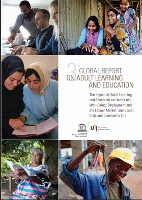
Dr Ricardo Sabates of the REAL Centre supported UNESCO Institute for Lifelong Learning with monitoring the progress of 139 UNESCO Member States in the areas of policy, governance, finance, participation, and quality of adult learning and education.
You can read the full GRALE III report by clicking here.
Blog: Teaching, learning and disadvantage – from policy to practice
In a blog post for the Impact Initiative - Teaching, learning and disadvantage: from policy to practice - Meera Samson of CORD and Pauline Rose of the REAL Centre outline the key messages which emerged from the workshop and demonstrate how research in India funded as part of the ESRC-DFID Raising Learning Outcomes programme will help to contribute towards an evidence-based strategy of reform across these issues.
Special Issue Call for Papers: International Studies in Sociology of Education
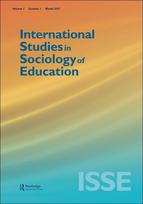
Authors are invited to discuss proposed papers with the editors of a special Issue in International Studies in Sociology of Education to represent new leading international work on migration and borders in the field of sociology of education.
Articles which examine, through sociological inquiry, issues of migration, borders and education are welcome - you can find further background information and the full call for papers at this link. Papers can address any national or transnational context, and can be empirical and/or theoretical in approach. The deadline for submissions is 20 November 2016.
Journal Article: Does private schooling narrow wealth inequalities in learning outcomes? Evidence from East Africa
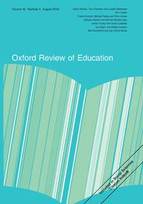
In many low- and lower-middle-income countries, private schools are often considered to offer better quality of education than government schools. Yet, there is a lack of evidence to date on their role in reducing inequalities: namely, the extent to which private schooling improves learning among the most disadvantaged children.
Through an analysis of household survey data from Kenya, Tanzania, and Uganda, Alcott and Rose demonstrate wealth gaps in access to private schooling, and use inferential models to account for observable differences between those who do and do not enrol in private schools.
Read the full article to find out how their findings raise a caution about the extent to which private provision can help narrow learning inequalities.
Higher Education Journal Article: Is equal access to higher education in South Asia and sub-Saharan Africa achievable by 2030?
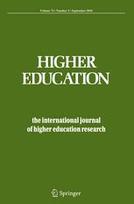
In this paper, they highlight the long distance still to travel to achieve the goal of equal access to higher education for all, with a focus on poorer countries which tend to have lower levels of enrolment in higher education.
Analysing Demographic and Health Survey data from 35 low- and middle-income countries in sub-Saharan Africa and South Asia, Ilie and Rose show wide wealth inequalities in particular, with few if any of the poorest gaining access to higher education in some countries. They further identify that wealth and gender inequalities interact and tend to be wider in countries where levels of higher education are higher.
Ilie and Rose conclude by suggesting that any measures aimed at attaining the equal access goal need to tackle inequalities in access within a system-wide approach, focusing on the level of education at which inequalities initially manifest, alongside higher education.
Click this link for the full article: Ilie, S. & Rose, P. High Educ (2016).
REAL Centre members at Girls' Education Forum 2016
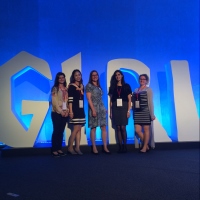
The Vice Chancellor, Professor Pauline Rose of the REAL Centre, along with seven REAL Centre research students attended GEF16. The Vice Chancellor announced the REAL Centre commitment to a partnership with Camfed to analyse the true cost of supporting a marginalised girl through secondary school and improving her learning. This will provide a reference point for the global community, ensuring that no girl is left behind in the drive for quality education for all.
Comments from REAL Centre research students about the event:
Arif Naveed: 'It was heartening to see that international development partners are placing their priority where it should be. In the largely patriarchal world, nothing is more promising for creating a socially just society than investing in the schooling of girls.'
Hiba Salem: 'I was incredibly stimulated by the Forum's inspirational women and leaders. It is an important reminder of our individual and collective duty to ensuring the world remains committed to promoting education for all; a reminder that our efforts matter, but that we must also never cease to aspire for more.'
Matt Somerville: 'We heard inspiring stories from the field of people working together to make real changes to the lives of girls with disabilities, their families, and communities.'
Hannah Ware: '...a fantastic opportunity to see some of the work being done to repair the gender inequality in education around the world. It was inspiring to hear so many strong women talk, particularly Nyaradzayi Gumbonzvabda who started by proclaiming "My name is Nyaradzayi, the rest is patriarchy"...'
One year anniversary celebrations of the REAL Centre

Kevin Watkins opened by reminding the audience that leaving no one behind will not be straightforward. To achieve the sustainable development goals will require concerted action, better data to hold policymakers to account, and avoidance of policy fads. This set the scene for insightful presentations and discussions on different approaches to measuring learning to inform policy, and warnings about what different types of assessment data can and cannot be used for.
A special focus was given to including children with disabilities in assessments of learning, and the potential of innovations in types of learning to assess - notably taking account of measuring how schooling influences self-esteem, self-confidence and attitudes to learning which should be seen as outcomes of education in their own right; as well as new approaches to collecting data on reasoning ability via open education resources.
You can view the event, and see the poster and programme.
Vacancy: Research Associate (Fixed Term)

The aim of the project is to provide an evidence-base on what works to support girls' secondary education, with a focus on Tanzania and Zimbabwe in particular. It will also identify the costs of providing good quality education to girls, and of scaling up such provision.
Using quantitative survey data collected from Camfed, as well as data on costs, you will provide quantitative analyses of the potential benefits of the Camfed intervention for participants and consider the role of attitudes and school factors in enabling learning benefits. You will also write reports for both academic and policy audiences, and prepare Powerpoint presentations for these audiences, as well as liaising with team members responsible for the qualitative analysis.
Applicants must hold a PhD in a relevant subject, and have relevant quantitative research training and experience. You should also have experience in statistical data preparation and analysis including experience of software packages, with a strong understanding of statistical methods and modelling. You should also demonstrate evidence of drafting reports and contributing to writing for publications.
For full details of criteria for appointment and duties of the post please see the Further Particulars.
Fixed-term: The funds for this post are available for up to 9 months in the first instance.
To apply online for this vacancy and to view further information about the role, please visit: http://www.jobs.cam.ac.uk/job/10783. This will take you to the role on the University's Job Opportunities pages. There you will need to click on the 'Apply online' button and register an account with the University's Web Recruitment System (if you have not already) and log in before completing the online application form.
Informal enquiries may be made to Professor Pauline Rose (pmr43@cam.ac.uk)
Please quote reference JR09516 on your application and in any correspondence about this vacancy.
Closing date: 13 July 2016
UNICEF Report – The State of the World’s Children 2016: A fair chance for every child
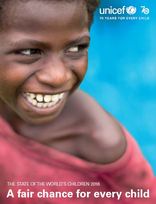
The report cites research by Professor Pauline Rose and Dr Ben Alcott, which was commissioned by the UK's Department for International Development (DFID) as part of a series on the future direction of education development in low-income countries.
Drawing on their analysis, the UNICEF report identifies that gaps in learning persist over the school cycle: as a result, by age 11, in rural India the most advantaged boys and girls are about six times more likely to learn basic reading and mathematics skills than girls from the poorest households whose parents were not educated. The Report highlights the importance of implementing strategies that address gaps even before children start school, and proposes the need for interim equity targets tracking progress for the most disadvantaged to achieve the sustainable development goals by 2030.
You can read the full report by Rose and Alcott - How can education systems become equitable by 2030? - and a summary of the key findings are available in a piece for The Guardian newspaper.
Thinking about Teachers, Teaching and the 2030 Agenda for Sustainable Development - Leadership for Learning (LfL) Seminar

The opening panel of this event in April included the REAL Centre's Professor Pauline Rose, alongside Montserrat Gomendio (OECD) and Antonia Wulff (EI).
The purpose of the 2016 seminar was to examine education Goal 4 of the 2030 Agenda for Sustainable Development - Towards inclusive and equitable quality education and lifelong learning for all - from the perspective of teachers and teaching.
You can watch the podcast featuring the opening panel contributions, download their presentations and read more about Cambridge Seminars.
Blog: Engaging the education workforce in reform efforts
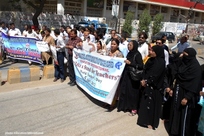
Monazza Aslam analyses research into the teacher workforce in Bangladesh, India and Pakistan. She argues that to achieve the Sustainable Development Goals, reform of the education workforce and engagement closely with teachers in the design and implementation of reforms are essential.
She explains how examples from the region showcase instances where monumental reforms have been successfully implemented through active engagement with teachers.
To read the full blog, click here.
Blog: One SDG indicator must be missed for education aid to reach those most in need
Pauline Rose and Asma Zubairi argue that there is one indicator that should be ignored if the overall aim of the goals of leaving no one behind is to be achieved: this indicator is associated with SDG target 4b, which calls for donors to spend more on higher education scholarships.
The blog highlights that not only is funding for these scholarships already substantial, but it rarely reaches the poorest and is at the expense of funds reaching other parts of the education system, which benefit those who most need them.
Click here to read the full analysis.
Disrupted education journeys for adolescent girls in conflict settings: new blog and infographic
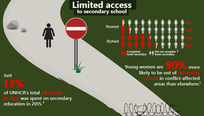
Update: The blog referred to in this article has been translated into French.
Vacancy: Research Associate (Part Time, Fixed Term)

The project aims to identify strategies to raise learning outcomes for all children, regardless of their background. It is widely recognized that teachers are central to a child's educational experience. Yet, in low income countries, disadvantaged learners often face poor quality teaching: many teachers are recruited without having a basic subject knowledge themselves, receive inadequate training with limited attention to strategies to support children from diverse backgrounds, and weak incentives and poor teacher governance can lead to low motivation and high levels of teacher absenteeism. The research will, therefore identify which aspects of teaching are most important for improving all children's learning, and so inform governments on the strategies needed to support children who face multiple disadvantages. The research will aim to make an important contribution in particular to how measures of learning need to be enriched to include children with disabilities.
You will be reviewing literature and supporting the design and analysis of the research for the project (particularly for the in-school qualitative research component), and also support the overall management of the project.
Applicants must hold a PhD in a relevant subject, and have relevant research training and experience. You should have an interest in classroom-based research in diverse settings. You will also have a track record of undertaking research literature reviews for projects and hands on research experience of qualitative methods, together with a firm understanding of quantitative methods.
For full details of criteria for appointment and duties of the post please see the Further Particulars.
Fixed-term: The funds for this post are available for 1 year in the first instance.
To apply online for this vacancy and to view further information about the role, please visit: http://www.jobs.cam.ac.uk/job/10390. This will take you to the role on the University's Job Opportunities pages. There you will need to click on the 'Apply online' button and register an account with the University's Web Recruitment System (if you have not already) and log in before completing the online application form.
Informal enquiries can be addressed to Professor Pauline Rose (pmr43@cam.ac.uk)
We hope to hold interviews in the second half of June 2016.
Please quote reference JR09145 on your application and in any correspondence about this vacancy.
Closing date: 09 June 2016
Pauline Rose delivers keynote at EBA seminar in Sweden
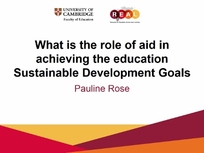
In this seminar Professor Paul Glewwe, and Professor Joel Samoff presented their new EBA reports in which they summarize and analyse conclusions from evaluations of aid to education.
Professor Rose's key note speech raised the question:
What is the role of aid in achieving the education sustainable development goals?
The Expert Group for Aid Studies (EBA) is a government committee that has been set up in order to improve Swedish development cooperation and to build up a long-term, high-quality knowledge-base.
Ricardo Sabates attends GIZ Roundtable on International Large Scale Assessments and Digitalisation

Topics discussed included the role of capacity development in low and middle-low income countries, international assessments as means to strengthen national education systems, readiness of countries to undertake assessments in digital formats, implications of digitization for acceptance, transparency and accountability within countries. The meeting took place on the 3rd of May in Bonn, Germany.
REAL Centre Seminar by Rodrigo Torres
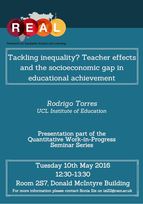
This will be the third in our quantitative work-in-progress series. Tea and coffee will be provided. For any questions, please contact Sonia on isi22@cam.ac.uk
Public Policy Strategic Research Initiative Seminar
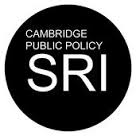
Understanding Inequalities: new thinking for public policy is a one-day seminar which will provide an opportunity for cross-disciplinary conversations about research and policy interventions on inequality.
Pauline Rose, Ben Alcott, Sonia Ilie, Ricardo Sabates will present:
Measuring inequalities in learning across and within countries in the context of the Sustainable Development Goals: lessons for policy
Video: Nidhi Singal - Establishing a dialogue on disability for higher impact
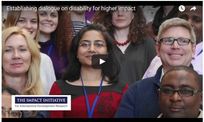
The workshop included around 25 researchers from seven projects funded under the ESRC-DFID Strategic Partnership, with participants from India, Kenya, Malawi, Uganda and the UK. They were joined by representatives of disabled people's organisations, donor agencies and international NGOs.
Nidhi Singal, convenor of the Workshop, outlines how the central aim of the workshop was to find a collective voice on how to increase the projects' impact.
See the Impact Initiative website to view the film and blog.
Jackie Kirk Outstanding Book Award: Gender Violence in Poverty Contexts

The Jackie Kirk Outstanding Book award annually honours a published book that reflects one or some of the varied areas of expertise represented in Jackie Kirk's areas of commitment, primarily gender and education and/or education in conflict (fragile states, post-conflict, peace education). Gender Violence in Poverty Contexts was described by the judges as making a major contribution to the literature in gender violence and education, particularly the empowerment of women and girls in contexts of education in conflict and post-conflict settings.
Edited by Jenny Parkes, Gender Violence in Poverty Contexts is part of a series of research-based monographs and edited collections which provide new analyses of the relationships between education, poverty and international development. The series editors are Madeleine Arnot and Christopher Colclough.
Blog: What impact can education research in international development settings achieve?
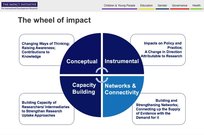
Professor Rose draws on the recent Impact Initiative panel at the CIES Conference in Vancouver where she presented some initial insights of an analysis of 'pathways to impact' alongside presentations from three projects (at different stages of their project phase) to map education research on to the Initative's wheel of impact: Conceptual impact on policy and practice; Instrumental impact on policy and practice; Networks and connectivity; Capacity building for research uptake.
She concludes with some further questions raised at the conference in Vancouver about what type of impact is desirable:
- Who defines impact? for example, is there a tension between expectations in the North and the South; or who defines what types of impact at the local level? (does this differ for a child in school compared with a local education official, for example)?
- Should impact be seen as an iterative process rather than a one-off outcome at the end?
- And does research need its own monitoring and evaluation framework if we are to judge properly whether research is achieving its intended impact?!
See the full blog What impact can education research in international development settings achieve?, and contribute your thoughts #impactlessons
Blog: Tracking progress towards learning for all by 2030 in Pakistan
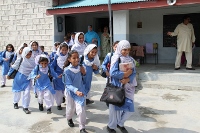
In the blog, Professor Rose highlights how the ambitious education target is the vital first step toward achieving the other goals. She shows how citizen-led assessments, such as Pakistan's Annual Status of Education Report (ASER-Pakistan 2015), not only present a picture of the challenge ahead by identifying the scale of the learning crisis, but also bring the focus to community-based solutions.
Vice-Chancellor calls for increased collaboration with Africa

In his remarks opening the Plenary Panel 'Advancement of Science in Africa Through Education,' Sir Leszek Borysiewicz also draws on analysis of the REAL Centre. He states:
"Let me share some of the findings of our Centre for Research on Equitable Access and Learning (REAL):
In Uganda, wealthy children are three times more likely than poorer children to have basic literacy and numeracy skills by the end of primary school.
Gender compounds this disparity: especially among the lowest income sector, boys are 30% more likely than girls to remain in education.
In Zambia girls are more than twice as likely as boys to drop out during primary school. Among those who stay on until grade 5, 25% of the poorest boys will pass the national maths assessment - but only 16% of the poorest girls.
The effects of poverty and gender inequality on future attainment are insidious.
One obvious conclusion is this: The most effective way to tackle inequality gaps in higher education is to address the inequality gaps in early learning."
The Vice-Chancellor stresses the need for collaboration to develop the capacity for excellent research across the continent. You can read his speech in full here:
http://www.v-c.admin.cam.ac.uk/professor-sir-leszek-borysiewicz/speeches/advancement-science-africa-through-education
The Impact Initiative at the Comparative and International Education Societies Conference
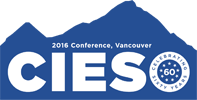
A panel, led by Pauline Rose, will explore how impact is being achieved through the 30 education projects funded under the ESRC-DFID poverty alleviation and raising learning outcomes programmes.
Three grant-holders - Kate Jere, Yusuf Sayed and Rebecca Thornton - will discuss how they have intended to achieve impact through their research, what has been achieved, and some of the difficulties faced.
Christine Beggs from USAID will lead a discussion on the panel. The panel takes place on Thursday 10th March.
Establishing Dialogue on Disability for Higher Impact
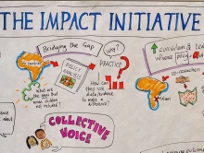
- A shared knowledge of 'impact' and the potential of the collective in achieving impact.
- Emergence of common overarching themes that are being addressed across the projects, which will be useful to address in engagement with policy makers and others.
- Greater appreciation of how working together can communicate shared objectives, conceptual, methodological and evidence based, to a larger group of stakeholders internationally and nationally.
- Familiarity with selected tools of dissemination and their potential (and challenges) in helping communicate effectively with a wider audience.
One of the recurring themes in the discussions was that disabilities is an issue that needs to be communicated more effectively not only to policymakers and development practitioners, but also to researchers in other development-related fields. When research on a range of issues surrounding poverty, or livelihoods, for example overlooks disabilities, large segments of populations often remain invisible, which not only renders the research less rigorous, but also affects policies and practice influenced by that research. The workshop resulted in a plan of action that included synthesis, messaging, and networking with a range of actors for stronger results.
We will share some of the outputs from the workshop shortly. Projects and researchers represented can be found on the Impact Initiative website.
Teachers, Teaching and Sustainable Development
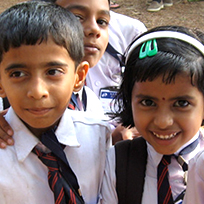
Thinking about Teachers, Teaching and the 2030 Sustainable Development goals will be the fourth seminar in this series. The purpose is to examine education Goal 4 of the 2030 Agenda for Sustainable Development – Towards inclusive and equitable quality education and lifelong learning for all – from the perspective of teachers and teaching.
This seminar series is sponsored by Open Society Foundations.
Women of the World (WOW) 2016: Let girls learn!

Globally 62 million girls are not in school. Where education offers an opportunity to gain the skills, knowledge and confidence to break the cycle of poverty, raise healthy families, and help build communities, how do we ensure girls have access the education they deserve? This panel considers the barriers facing those who are excluded from school. Chaired by Professor Pauline Rose (Cambridge University), with Mabel van Oranje from Girls Not Brides, Katherine Wilson of Carers UK, Human Rights Watch's Elin Martinez, Deb Taylor from Cambridge University Disability Resource Centre, and WOWser Camilla Penney.
Book here. For further information on the WOW programme, click here.
The Monitoring Effect
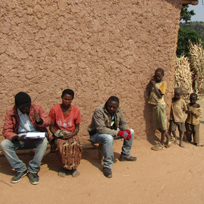
Dr Sabates and his collaborators from Laterite-Africa investigated how different monitoring strategies for farmers affected the participation of farmers in training programmes and also the adoption of best practices to increase coffee productivity. Education and training is an important component of development programmes, and many international organisations develop different monitoring tools to improve the participation of beneficiaries in different programmes. The monitoring strategy could change the way in which individuals behave partly as a response of being observed, as a result of being reminded of the programme or by raising awareness of the important of the project. Although we are unsure about the exact mechanism for the transmission of the potential effects of monitoring, this research show substantial benefits for those who were monitored more regularly and intensively.
Publication: The Effect of Monitoring: How Data Collection Type and Frequency Boosts Participation and the Adoption of Best Practices in a Coffee Agronomy Training Program in Rwanda
REAL at CIES Conference in Vancouver, 6-10 March

The Comparative and International Education Society (CIES) was founded in 1956 to foster cross-cultural understanding, scholarship, academic achievement and societal development through the international study of educational ideas, systems, and practices. The 2016 CIES conference has a distinctive focus on celebrating its 60th anniversary.
Panel: Changing discourses in inclusive education: reflections on the journey, implications for the future - Panel Convenor: Dr Nidhi Singal
Dr Nidhi Singal: Teachers' enactment of 'inclusive education' in Indian classrooms
Tues 8 Mar 9:45 - 11:15, Grand Ballroom A
Panel: Large-scale data in international and comparative education research and policymaking: Opportunities, challenges, and next steps
Discussant: Professor Pauline Rose
Professor Anna Vignoles: Creating longitudinal databases in developing countries, lessons from existing efforts
Dr Ricardo Sabates: The potential and limitations of large-scale databases to inform policy
Wed 9 Mar 9:45 - 11:15, Grand Ballroom D
Panel: Aspirations, access, and outcomes in higher education
Dr Sonia Ilie: The Road to Equitable Access for Higher Education: the Importance of Tackling Early Learning
Thurs 10 Mar 8:00 - 9:30, Pavilion Ballroom A
Panel: The role of PAL Network assessments in ensuring no child is left behind
Dr Ben Alcott: Early assessment of learning is critical in ensuring that no child is left behind
Thurs 10 Mar 9:45 - 11:15, Junior Ballroom D
Panel: Achieving impact through research on education in international development settings
Panel Convenor: Professor Pauline Rose
Professor Pauline Rose: How is impact understood in research on education in international development settings, and what are the pathways to its achievement?
Thurs 10 Mar 11:30 - 13:00, Room 661
Blog on the Supporting Syria Conference by Hiba Salem

In the blog, she reports on the outcomes of the Syria Donors Conference and what it means for the livelihoods and education of Syrian refugees.
Hiba Salem is a Syrian national and doctoral student at the University of Cambridge. Her research interests focus on the education of Syrian refugees in host countries neighbouring Syria, principally the situation in Jordan.
Blog: Access and learning are equally important for children with disabilities
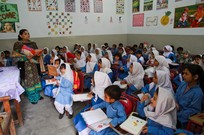
The blog highlights the importance of initiatives which are taking steps to include children with disabilities, including ASER Pakistan's large scale assessment, with the aim of identifying both the numbers of children with disabilities enrolled in schools and their level of learning.
Vacancy: UL in Education and International Development

The successful candidate will work closely with the team of colleagues working in the field of education and international development and is expected to have a strong grounding in research methods. We particularly welcome applicants from a range of different social science-related disciplinary perspectives with experience of research in international development settings. He / she will be expected to make an immediate contribution to the Faculty's research to strengthen the international profile of research within the Faculty. The post will involve the teaching and supervision of Undergraduate and Masters students as well as the supervision of PhD students.
Applicants should have a doctorate (or equivalent qualification), a record of internationally excellent research, and relevant experience of working with undergraduate and postgraduate students. Contributions to excellence in research will be judged through peer-reviewed publications and other activities of a kind and quality that meet international standards as assessed in national research assessment exercise.
To apply online for this vacancy and to view further information about the role, please visit: http://www.jobs.cam.ac.uk/job/9005. This will take you to the role on the University's Job Opportunities pages. There you will need to click on the 'Apply online' button and register an account with the University's Web Recruitment System (if you have not already) and log in before completing the online application form.
Informal enquiries should be directed to Professor Pauline Rose: pmr43@cam.ac.uk.
We hope to hold interviews in April 2016.
Please quote reference JR07888 on your application and in any correspondence about this vacancy.
Closing date: 13 March 2016
REAL Centre Seminar by Aditi Bhutoria
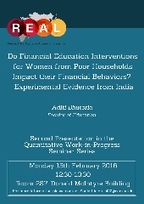
This will be the second in our quantitative work-in-progress series. Tea and coffee will be provided. For any questions, please contact Sonia on isi22@cam.ac.uk.
Blog: Why the Syria Donors Conference Matters Globally

Hiba Salem writes that 'A generation of distressed and unsupported children continues to develop as the conflict prolongs with an inadequate response.' She highlights the Syrian Donors Conference on 4 February in London which '...has arrived at a critical time and has the potential to influence the long-term response plan and funding capacity for the Syrian crisis.'
Hiba Salem's research interests focus on the education of Syrian refugees in host countries neighbouring Syria, principally the situation in Jordan.
ASER-Pakistan: 2015 Annual Status of Education Report

In this 2015 report, Professor Pauline Rose writes a piece on 'ASER's contribution to ensuring learning for all is achieved by 2030 in Pakistan' (see p.15 of the report). She outlines how ASER Pakistan data provide an invaluable resource to understand the extent of the learning crisis and to give focus on what needs to be done: 'Putting the data into the hands of disavantaged members of the community helps to give them the power of information to hold schools and government officals to account, and to work together with teachers and others to identify strategies to provide their children with opportunities to learn.'
In another piece of the report, 'Schooling status and learning outcomes for children with disabilities' (see p. 29 of the report) Dr Nidhi Singal and Dr Ricardo Sabates, both of the REAL Centre, present the main findings from the ASER 2015 survey that captured information on disability from all rural districts of Punjab.
Blog: Women fight terror through education

Aliya Khalid writes that there are "...signs of an emerging awakening, a resilience of women to violence and a determination to improve and pull out of the darkness. The new idea which is propelling this awakening seems to be education."
See here for the full blog.
Let girls learn in conflict settings

University of Cambridge together with the Georgetown Institute of Women, Peace and Security spearheaded a gathering of some of the world's leading experts last week. The aim of the meeting was to develop a research agenda that will provide policymakers with the information they need to make evidence-based policy decisions on improving education for girls affected by conflict, particularly those who are forced to flee their homes.
University of Cambridge Vice Chancellor Leszek Borysiewicz led the meeting along with Ambassador Melanne Verveer, from the Georgetown Institute for Women, Peace and Security.
Professor Pauline Rose of the REAL Centre, who is leading the partnership on Cambridge's behalf, explains the importance of overcoming barriers to girls' education in conflict settings: "It is vital that we smooth disrupted transitions that adolescent girls face in their education journey in conflict-affected settings - this means addressing the obstacles these girls face from home to school, and from school to work. We urgently need a stronger evidence-base to guide policymakers in making sure these girls are not denied their right to education and can support social cohesion for future generations."
Click here for the full story.
NEW MPhil in Education, Globalisation and International Development

For further information and to apply, click here.
Impact Initiative Launch

The Impact Initiative for International Development Research is a partnership between the University of Cambridge's Research for Equitable Access and Learning (REAL) Centre in the Faculty of Education and the Institute of Development Studies (IDS). The Initiative aims to increase the uptake and impact of research from two research programmes jointly funded by ESRC and DFID: the Joint Fund for Poverty Alleviation Research and the Raising Learning Outcomes in Education Systems Research Programme. It develops programme-level communication resources to share ESRC-DFID funded research and commission outputs such as synthesis reports, policy briefs and data visualisations, sharing knowledge with targeted audiences of policy actors, practitioners and intermediaries to support better informed decision making.
James Georgalakis, Director of Communications and Impact at the Institute of Development Studies (IDS), and the Director of the Impact Initiative explains in a blog, Brace for Impact, on the new site how the programme aims to increase research uptake and impact across eight key development research themes: "You can explore the research via an interactive map, by theme or by country. It is hoped that longer term this strategic approach to supporting programme level communications, engagement and impact, and the learning arising from it, could be applied to other research programmes beyond those the Initiative is currently focused on."
Cambridge International Development Conference (CamIDC)
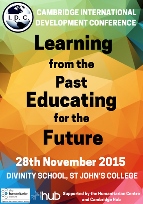
CamIDC is an annual student-run conference which brings students and professionals into contact with those working at the forefront of international development, whether formulating policy, developing new strategies on the ground, or expanding the academic discipline.
This year the conference will focus on the 'Past, Present and Future of International Development'. It aims to engage with the past and present international development processes with a focus on the role of education. It will also look at new or alternative development strategies for the future, while learning from the past. Dr Arathi Sriprakash will particpate in a panel called 'Children's Futures in the Global South.'
Visit to Rwanda by Ricardo Sabates
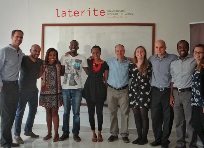
Where now for peace education in the twenty first century?
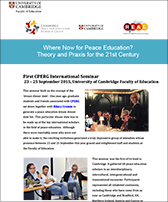
Where now for peace education in the twenty first century? An inter-generational group of world-leading scholars discuss...
Also available - the full Programme with abstracts and biographies of keynotes and paper presentations.
10th International Conference: Institute for Educational Development, Pakistan
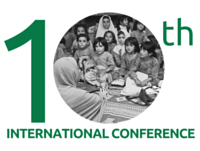
The theme for the conference is "A Renewed Focus on Teacher, Teaching Quality and Learning: Localised Models and Practices". Considering the vital impact of quality education experience on learning, the conference calls for "renewed focus" on three principal pillars of an educational system including: teacher, teaching quality and learning. It aims to generate a comprehensive discourse on the three key elements with a particular focus on localised models and practices and associated challenges and opportunities for their implementation. The keynote speakers for the conference are: Professor Marie Lall of University College London; Professor Pauline Rose of the University of Cambridge; and Professor Yusuf Sayed of the University of Sussex.
Exploring Violence in Schools Using Visual Methods: Findings from Brazil and the UK

Joyce Mary Adam, Cesar Leite, Debora Fonseca and Jose Arago will present findings from a UNESP-funded project that they carried out in two urban fundamental schools in Rio Claro-Sao Paulo Brazil. This project investigated the behaviours of students when faced with conflict situations in the school and social violence, through the analysis of images produced by students, utilizing the visual voices methodology.
Hilary Cremin will present findings from a British Academy-funded Visual Voices project that she carried out in an urban secondary school in the UK which investigated official and unofficial discourse of inclusion, disaffection, and discipline in schools. She will discuss the ways in which visual methodologies can enable rich data to emerge in ways that young people find engaging and provocative.
For more information, please click here or visit http://talks.cam.ac.uk/talk/index/62473. RSVP to Ann at aw244@cam.ac.uk
Problematic Politics
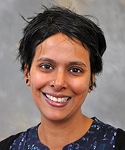
For further information, see http://talks.cam.ac.uk/talk/index/62457
WISE Summit 2015: Reflections by Pauline Rose
In this blog, she reflects on some important themes and messages coming out of the summit, including the need to shift focus to secondary education for girls; the importance of continuing to address remaining inequalities in primary education; targeting of funding to the most marginalized; and adopting a progressive approach to free upper secondary education.
Minister for Education, Government of Rwanda, meets Pauline Rose and Ricardo Sabates
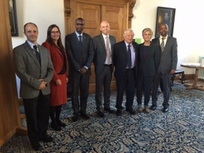
Sibs, schools or sorting: What drives educational inequality in East Africa?

Sam Jones, Associate Professor of Economics at the University of Copenhagen, will present his research that identifies the unique contributions of siblings, schools and sorting effects to variation in learning outcomes. His study applies a novel technique to UWEZO test score data, covering over one million children across East Africa.
For more information, please click here or visit http://talks.cam.ac.uk/talk/index/62038.
RSVP to Diane at drc43@cam.ac.uk
Education that adds up: REAL Centre in Special Issue on India of Research Horizons

The article highlights the work of REAL Centre members and the newly funded ESRC-DFID research programme that is looking at ways to improve the effectiveness of teaching quality in Indian and Pakistan to ensure that '...education adds up,' and the quality of education improves. As Professor Pauline Rose is quoted in the article: "Education increases opportunities in life: it can pull people out of poverty, with better jobs and higher wages; for girls, education often results in delaying marriage and having fewer children, who as a result are healthier...Nationally, a young educated workforce can transform the wealth of a country."
The Child Poverty and Development blog - Reviewing 'The Poor Child'
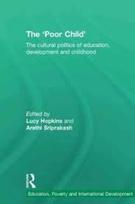
Festival of Ideas: WOW Lecture: #UpForSchool

With the highly publicised #UpForSchool campaign and the announcement of the Sustainable Development Goals that will guide international action for the next 15 years, this session considers the key issues in the education debate and implications for future action.
To see more information and to book a place, see: www.festivalofideas.cam.ac.uk/events/wow-lecture-upforschool
Delegation of Ghanaian Principals visit REAL Centre
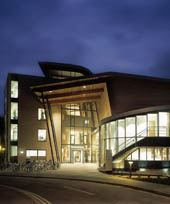
During the visit to the REAL centre, the principals engaged with members of staff teaching on the science and primary PGCEs, providing an opportunity to reflect on differences, particularly the amount of time spent in schools. The principals also had an opportunity to speak with research staff at REAL, introducing overall themes as well as specific projects, such as Leadership for Learning and OER4Schools. The visit to Cambridge was facilitated by the Transforming Teacher Education and Learning programme (T-TEL, www.t-tel.org), a UKAID-funded Government of Ghana initiative to support College of Education in their transition to tertiary institutions. The principals were accompanied by the Director of Tertiary Education (Ministry of Education, Ghana).
Achieving the education SDG: Start early and stay the course

Universal access to quality education - IGC Blog by Dr Ben Alcott and Professor Pauline Rose
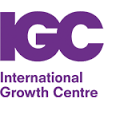
Monitoring progress on the new Global Goal for access to education will require research to capture data on the most disadvantaged children, particularly those excluded from formal schooling.
In this IGC blog, Dr Alcott and Professor Rose argue that better data makes better policy. For educational access, this means gathering more data, over longer time periods, and working to integrate it with existing administrative data to produce richer evidence-bases for policymakers.
Cambridge-Africa Day, 23rd October 2015

There will be a wide range of short presentations about Cambridge's involvement in research capacity building in African institutions, and the numerous mutually-beneficial collaborative research and development projects that Cambridge and African researchers and students are involved in. Professor Pauline Rose of the REAL Centre will chair the first session on Cambridge-Africa Research Collaborations. The event will be free to attend, but places will be limited so do book your place by 8 October.
Workshop on the Cultural Politics of Education, International Development and Childhood

To mark the release of a new international collection, The 'Poor Child', edited by Lucy Hopkins and Arathi Sriprakash, we invite you to a workshop on the politics, representation, and reform of 'childhood' in relation to global poverty, education, and international development. Presentations by Professor Erica Burman (Manchester), Dr Virginia Morrow (Oxford), and Dr Arathi Sriprakash (Cambridge) will be followed by discussions and refreshments. Full details of the event can be found here. This workshop is supported by the Education Equality and Development Academic Group and the REAL Centre, University of Cambridge.
5 steps to achieving the goal of educating every child in the world
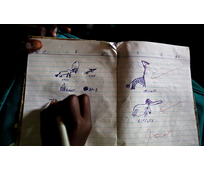
"Five steps to achieving the goal of educating every child in the world" outlines how for all young people to have a good education by 2030, we must focus on greatly improving the learning opportunities of disadvantaged children.
Professor Pauline Rose to speak at Alumni Festival 2015
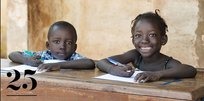
Where Now for Peace Education?: Theory and Praxis for the 21st Century
REAL at UKFIET 2015

Special Issue of PROSPECTS Edited by Professor Pauline Rose
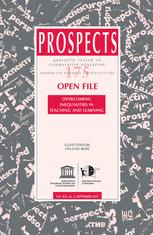
In an article published as part of this special issue, Dr Benjamin Alcott and Professor Pauline Rose of the REAL Centre investigate the global learning crisis through a comparative analysis of rural India and Pakistan. "Schools and learning in rural India and Pakistan: Who goes where, and how much are they learning" demonstrates that socioeconomic status and gender are important determinants of whether children are in school, the type of school they attend, and whether they are learning.
BAICE Thematic Forum on Disability and Education
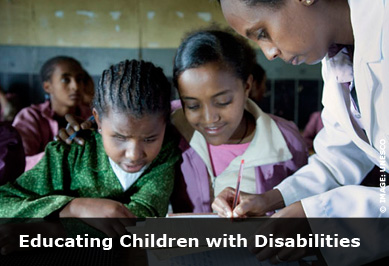
Conference on conflict in Colombia: Education holds key to peace
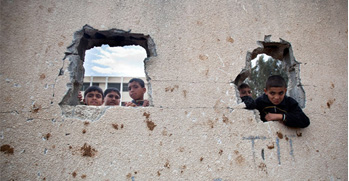
Education, Conflict and Peace in Colombia: 29-30 June

The REAL Centre is one of the sponsors of the event.
The event will consist of 2-day conference and workshop that will explore education as a critical but overlooked aspect of the Colombian peace process. In this context, the event will focus on addressing the question, “How can the education sector contribute to sustainable peace in post-agreement Colombia?” While the first day will consist of key-note addresses by Colombian experts and a panel of educational researchers who will be sharing lessons learned from other conflict-affected societies, they second day will consist of workshop which seeks to identify policy recommendations in order that the Colombian education sector can more effectively contribute to peacebuilding.
The event has two main objectives:
1. Generating a policy briefing document for distribution among key governmental, non-governmental, national and international stakeholders that are involved in Colombia’s peace and education reform processes.
2. Facilitating the opening up of a conversation about the relationship between education, conflict, and peace in Colombia that will carry on beyond the two-day event, engaging both Colombia-based and UK-based actors. Visit the conference website for more information.
REAL Centre now launched!
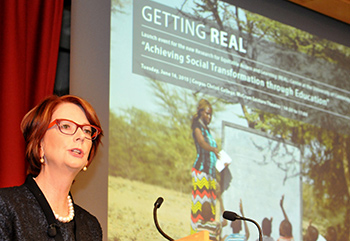
Read more about the launch here.
Cambridge gets REAL about overcoming obstacles to global education

Read full article.
Live Launch of the REAL Centre - 16th June

A video of the live stream will be made available later.
Further information will be on the REAL Centre pages:
Education and Disability: Oslo Summit for Education and Development

The Ministry of Foreign Affairs, Norway has appointed an international group of nine experts to work on a vision document for including children and young people with disabilities in international efforts towards education for all.
As a member of this group, Dr Nidhi Singal is focusing on the current contributions and future role of empirical research in achieving this goal.
This appointment is an acknowledgement of the high quality of research undertaken by staff and students on disability and education in the Global South at the Faculty.
REAL Centre launch next week

REAL Centre Launch

Tuesday, 16th June 2015 1430 - 1700
McCrum Lecture Theatre, Corpus Christi College, Cambridge
Evening Reception 17:00 - 19:00
To mark the launch of the new Centre for Research for Equitable Access and Learning (REAL) at the University of Cambridge, please join us for the REAL Centre’s inaugural seminar, in association with Camfed:
Welcome and Introduction:
Professor Sir Leszek Borysiewicz, Vice-Chancellor of the University of Cambridge
Keynote Speakers:
Julia Gillard, Chair of the Global Partnership for Education and former Prime Minister of Australia
Hans Brattskar, Deputy Minister of Foreign Affairs, Norway
Moderator:
Dame Barbara Stocking, President, Murray Edwards College, former CEO of Oxfam GB
REAL Centre Launch 16th June 2015: Full details and how to register |
As we approach the 2015 deadline for the Millennium Development Goals, considerable progress has been made in reducing poverty, improving health outcomes and getting more children into school. Despite this progress, many of the most disadvantaged groups continue to be left behind, both in terms of access and the quality of the services they receive. Notably, girls in developing countries from poor households in rural areas, and those with disabilities, continue to be unlikely to complete primary school; even if they do, they are likely to be amongst the 250 million children who have not learnt the basics. Girls’ education is particularly vulnerable to security concerns, including risks of gender-based violence, which is heightened in situations of armed conflict. Yet evidence shows that education is one of the most important factors for social transformation, ensuring that future generations inherit a more just and equitable world. As a result, global leaders are now turning their attention to ensuring that future international development goals focus on overcoming social inequalities and achieving gender equality.
To celebrate the launch of the Centre for Research for Equitable Access and Learning (REAL) in the Faculty of Education at the University of Cambridge, the Director of the Centre, Pauline Rose, Professor of International Education, will be joined by leading academics, girls’ education experts, social policy specialists and representatives of international development agencies to discuss the transformational impact of education, with a focus on the importance of girls' education in particular.
Join us as we share the latest research and innovations in education that are unlocking girls’ and young women’s potential, and driving social transformation.
Your ticket includes an evening reception from 1700 - 1900
For more information, please contact: REALCentre@educ.ac.uk
Evidence and Policy Directorate Announced
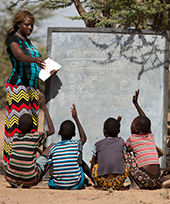
The Evidence and Policy Directorate (EPD) will focus on providing support to both the ESRC-DFID Joint Fund for Poverty Alleviation Research and the Raising Learning Outcomes in Education Systems Research programme.
